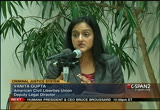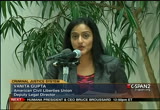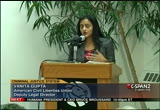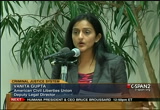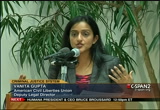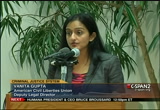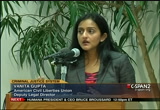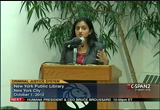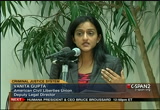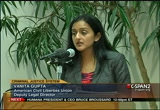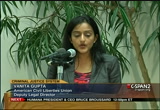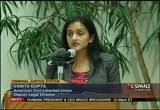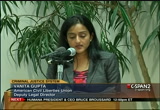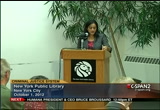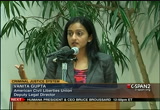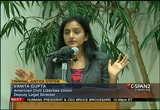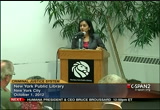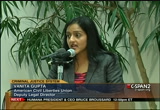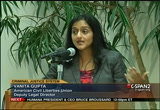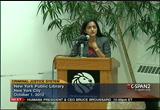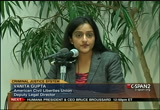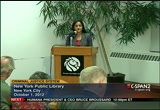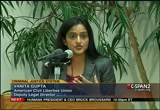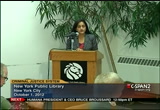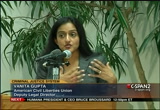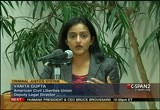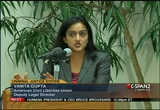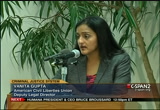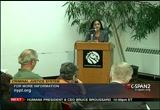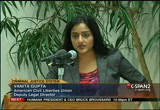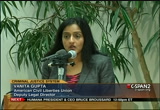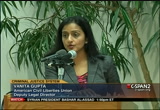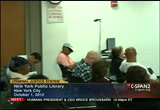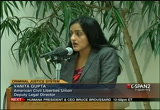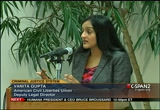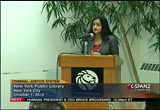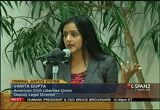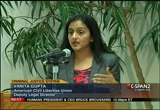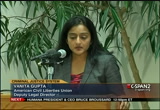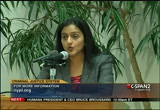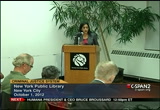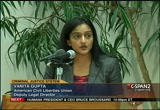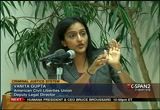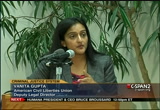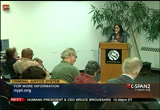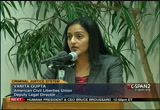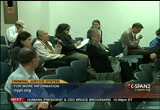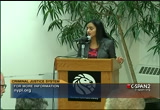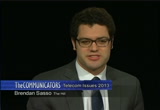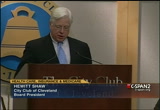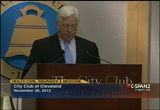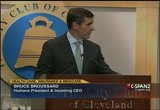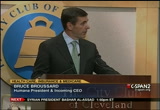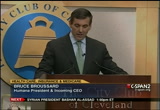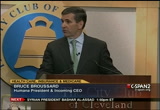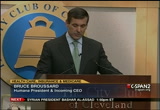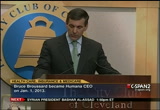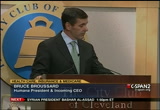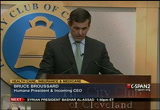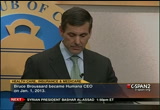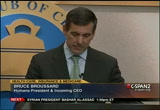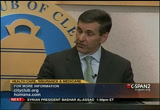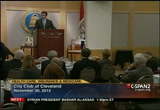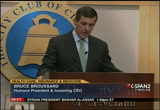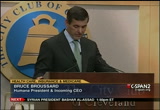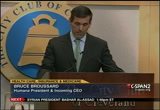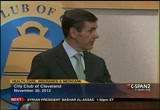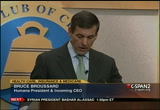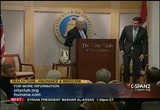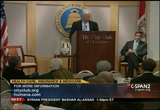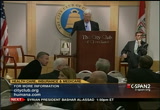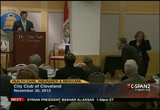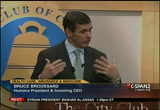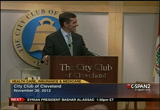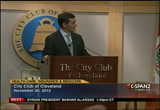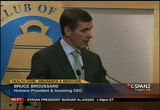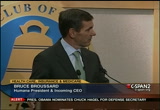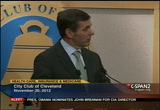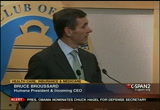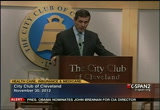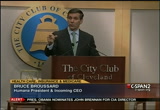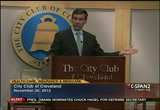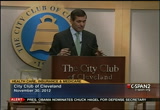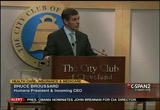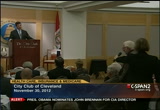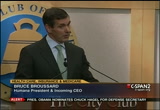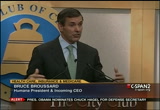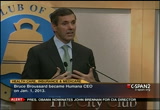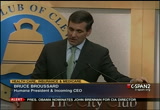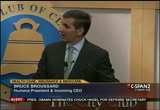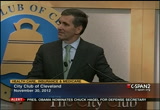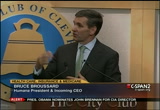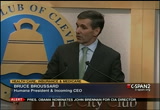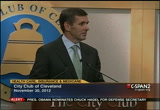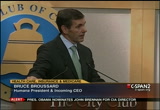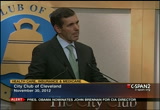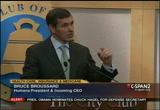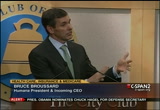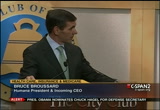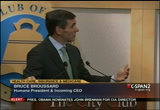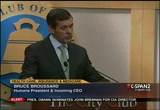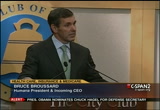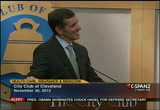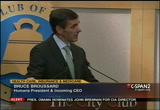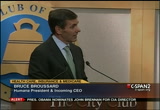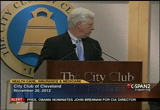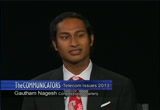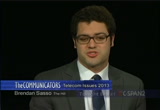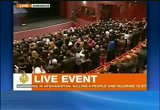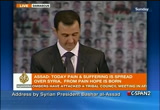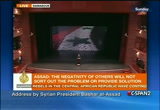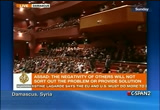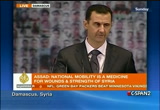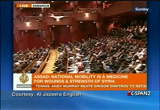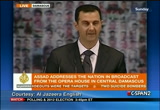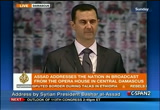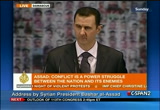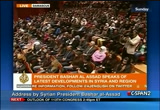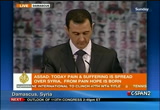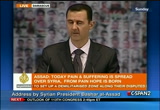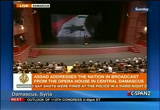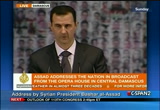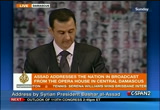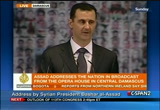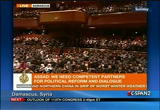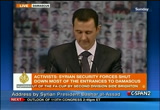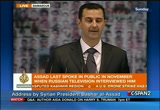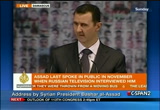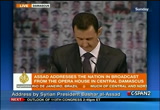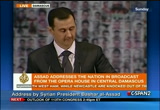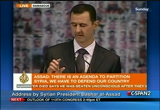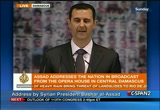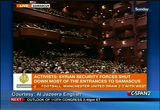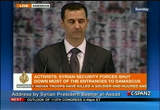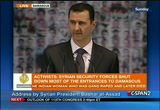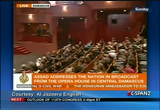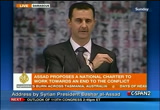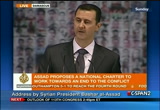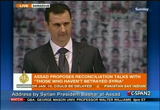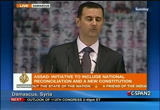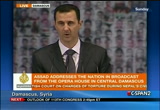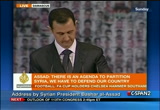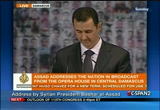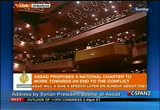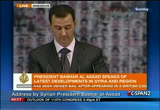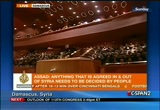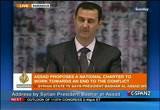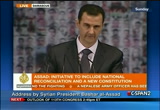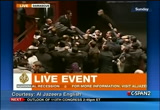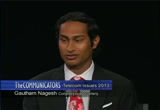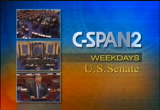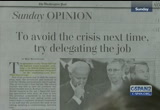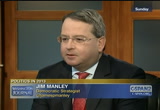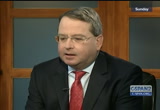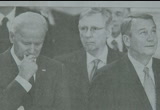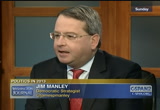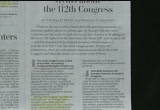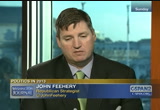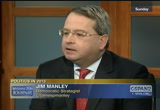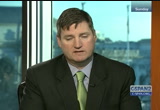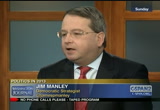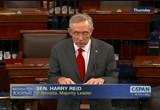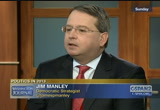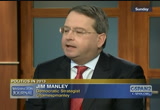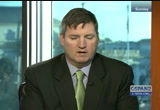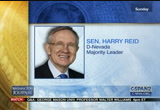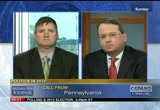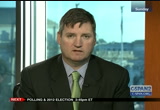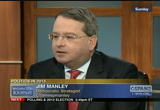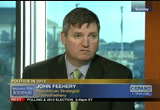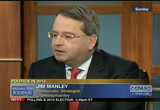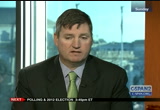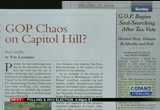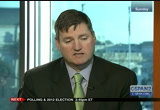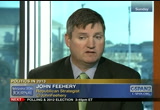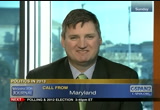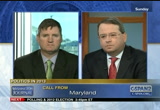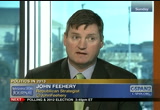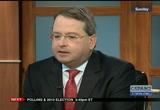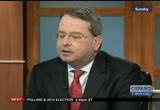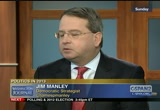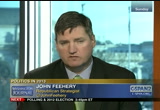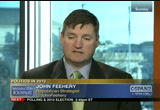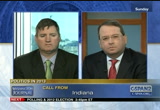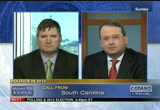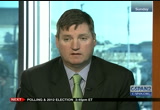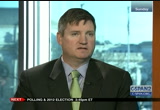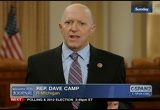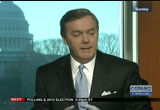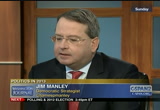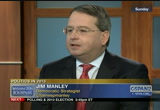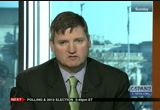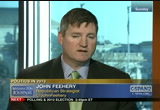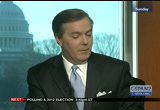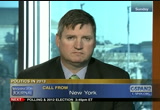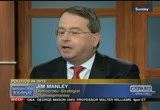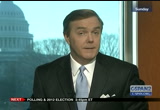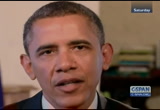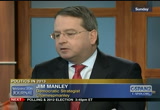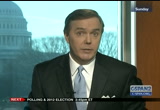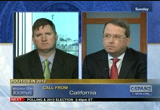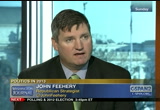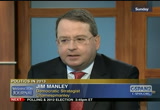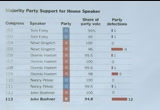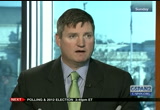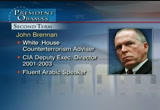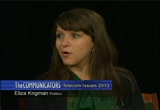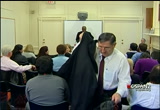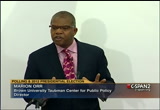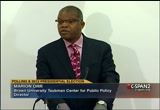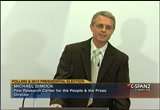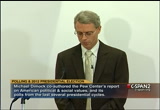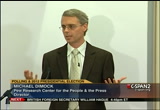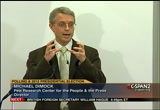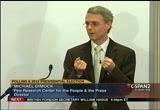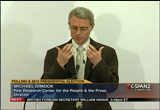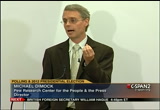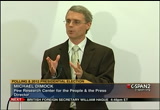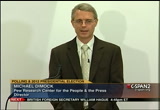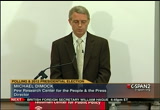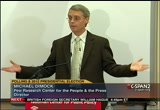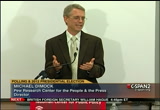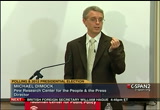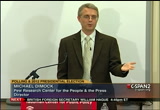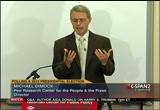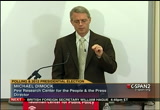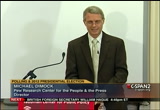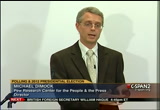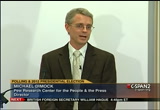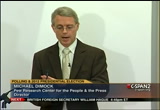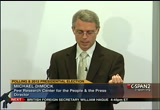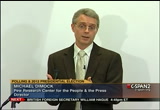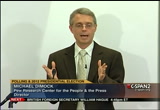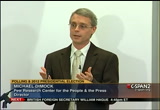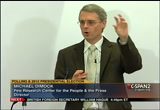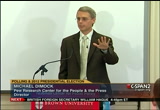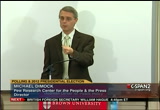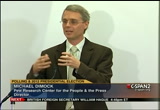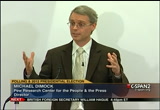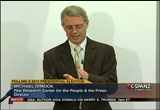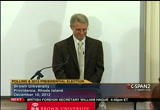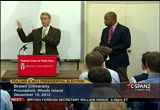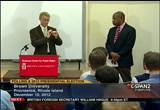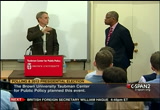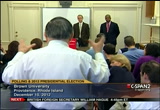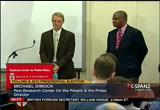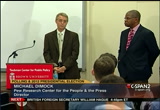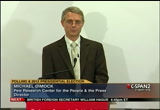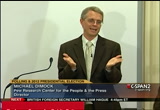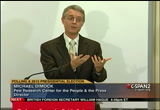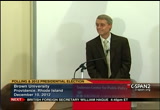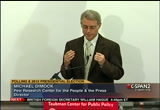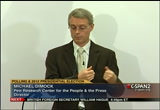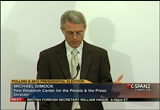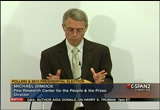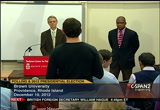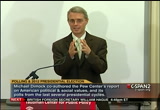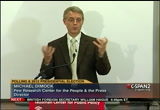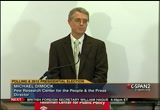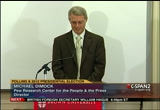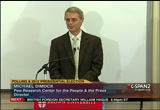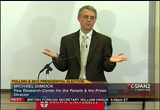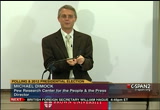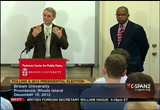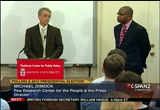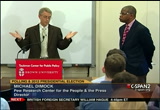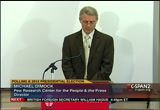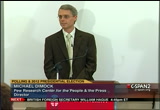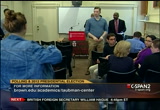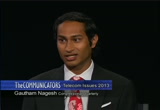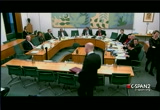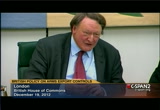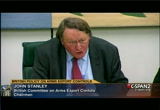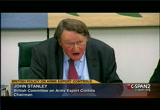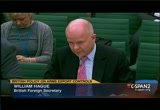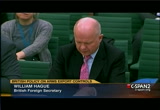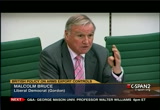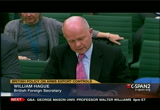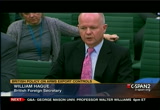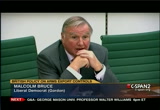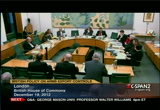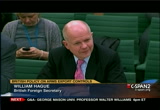tv U.S. Senate CSPAN January 7, 2013 12:00pm-5:00pm EST
12:00 pm
>> who are, who have counsel that have never done any criminal cases, and that's a real tragedy in this country. i went down to about four weeks after september 11th. i had no idea whether anyone in this area of texas had ever seen a south asian person, and it turned out that the only south asian person most of these folks had ever seen were with sanjay gupta on cnn, and i got asked if i was related to him repeatedly. i still haven't met him, but one day when i do, i'm going to thank him for opening a lot of doors for me in west texas just several weeks after 9/11. i went down, and i had no
12:01 pm
experience. i mean, i had gone to law school, i had done clinics in law school, but i didn't really know what i was doing, and i just had to rely on some common sense. so i went to the courthouse. i spent a lot of time pulling files trying to understand, okay, which lawyer represented which person as part of the sting, what was the race of this person, what was the sentence of this person? did they go to trial, did they plea? i literally was making a matrix in my head about these cases and trying to understand what it was that i was going to try to do. um, i came back, i bought a suitcase at wal-mart because i had to stuff it with a whole bunch of papers and photocopies that i had made from the courthouse. i also, by the way, spent a lot of time with the families in this town who were somewhat skeptical of a person coming down from new york, rightfully. wondering, you know, there's been some interest in these cases, but people come and go. and i tried to spend as much time as i could to really try and put the pieces together of what had happened in this case.
12:02 pm
and i went back to new york and the place i was working at the time that this is exactly what we need to get involved with. i was able to get the interest of several prominent law firms in washington, d.c. and new york to work with me to represent the dozens of people that needed representation. and then bob herbert from "the new york times" actually ended up picking up on the cases and writing a series of columns in "the new york times" that really, i think, shamed the texas media which had been asleep at the wheel for two years about these cases. tom coleman had actually been given lawman of the year award by then-attorney general john john cornyn who is now at the u.s. senate. there's a photo of john cornyn handing tom coleman that award, and i will say "the new york times," think, was responsible for undoing that narrative and really telling a different story about what had happened in this small town. and bob herbert kind of worked
12:03 pm
off of some tremendous work that had been done by a local investigative reporter, nate lakesly down in texas, and adam liptak was down there for a series of hearings. we had a lot of national media. suddenly people magazine wanted to write about one of my clients who had four kids that had been arrested as part of this sing. we, bill to reilly was suddenly -- o'reilly was suddenly claiming credit for turning the situation around after covering the cases three times on his show. you can imagine that ldf wasn't frequently on the same side as bill to reilly, especially on criminal justice. and suddenly people were all about understanding the flaws in our criminal justice system in a way that i don't think had ever been, you know, very real to folks. and that was a critically important piece or contribution, i this i, of -- i think, of the
12:04 pm
cases. ultimately, kind of fast forward, governor rick perry pardoned my clients and exonerated them, but the reality is that that several of my clients left prison suffering from severe depression upon their release and developed very significant, um, issues after having been imprisoned wrongfully for four years. i remember calling and desperately trying to find a drug treatment for four of my clients who were living in their cars without any place, they couldn't get jobs because everyone, despite the exonerations, were still convinced they were guilty. and i remember calling around to the only drug treatment center for indigent folks, for poor folks in west texas and being told that probably i should get them reincarcerated because there in prison they were actually able to get treatment. and the absurdity of that was apparent to me. it was harder to find a treatment center in west texas than a prison. there were prisons everywhere.
12:05 pm
and some of my clients, like maddie white -- who had four kids arrested as part of the sting -- actually worked for the prisons because it was a huge, significant employer in the area. i spent about a year trying to leverage systemic reform after the cases, so there were hearings on the hill around certain aspects of the drug, the department of justice funding, federal funding. there were hearings in the texas state legislature about improving indigent defense, about trying to address the war on drugs and policies that had led to what had happened, but nothing was passing. this was at the kind of the height of the prison-building machine in texas. and it kind of made me while i had felt like i had achieved a great deal for my clients, it made me fairly depressed at the prospects for systemic reform. i was showing you the numbers. in 2003 the picture was bleak. it was a very bleak picture. it looked like there was only one direction for this
12:06 pm
trajectory, and that was kind of to build and build more prisons. it turns out, and i was doing this all from a litigator's perspective, that i couldn't -- we weren't going to litigate ourself out of mass incarceration. and i will say that kind of traveling a distance over the last ten years doing this work on criminal justice reform, working to improve public defense, working to address police misconduct, working to address sentencing policies, i today feel more hope than i ever have that we will end the system of mass incarceration in this country, and i'll explain why for a few reasons. there are a few things that have come together, and some of the charts actually describe it. is -- one is that the whole country is witnessing a reduced crime period right now. crime and criminal justice is not a top five issue. it's probably -- it may not even be a top ten issue on people's radars.
12:07 pm
there's polling that's been done. and that's unusual. if you look back to 1988 and the willie horton ads that were used successfully to kind of deplait michael dukakis' campaign, over and over again crime and criminal justice has been a very kind of politicized issue, and there hasn't been a space, a sufficient space to really look at what kinds of policies we need to enact to better protect our public safety devoid of a lot of emotion and politics. that has changed. in part because of low crime rates. there's a lot of studies talking about why that is the case. um, but we are experiencing historically low crime rates around the country. a second factor is that the recession has, actually, there's been a silver lining, and that's that the recession has actually yielded or forced the hands of state lawmakers that have largely been responsible for enacting over the last 40 years tough-on-crime policies. it's forced their hand so they have to stop being addicted to
12:08 pm
incarceration. incarceration is very expensive. the average cost for incarcerating someone in a prison is between $18-$30,000 a year. and went you have the kinds of numbers you do, and i talked about the amount of money corrections is taking up in our state budgets, that a significant amount of money. and what that's done is to open up the door for new allies that are, frankly, far more influential in a certain sense, tough-on-crime folks who are now talking about criminal justice reform as a conservative issue. and you won't believe this, but it is truly the case. we have people like newt gingrich penning op-eds in the e washington post" talking about criminal justice reform as a conservative issue. we have groups like right on crime that have become established such as now that we have figureheads such as pat nolan, grover norquist, fiscal conservatives who are now talking about criminal justice reform.
12:09 pm
it has brought new allies that are, obviously, significant validaters to the kinds of messages that the american civil liberties union has been trying to work on for several years, and it is a positive development for the work that we're trying to do. get tough on crime politicians now are talking instead about being smart on crime. they're trying to enact bills that support evidence-based practices like diverting people charged with lower-level drug offenses into treatment and imposing nonprison sanctions on those who violate the technical terms of their probation and parole instead of simply returning them to prison. about a third of people who enter spriz are entering for technical parole violations. in california it's actually almost two-thirds. this is really the first sustained opportunity that we have as a country in 40 years to look at our incarceration policies and to do something radically different. i think that's going to take, though, a seismic shift in thinking. because i think the addiction to
12:10 pm
incarceration isn't going to be kind of -- this is, you know, mass incarceration or overincarceration has come about as a result of 40 years of policies and laws around the country in local jurisdictions, in state jurisdictions, in the federal government being enacted. there's no silver bullet for reform. we can't pass the voting rights act to enfranchise millions of people in this country. there's no silver bullet. it's going to take sustained work at the local and state level and at the federal level to really achieve reform. but the prospects are there because we have now a kind of broader coalition, a bipartisan coalition working to do this. i think it's a shame that we fail to inspire multiracial masses to march in the streets around the country for a sustained period of time to really demand criminal justice policies, but the reality is that there are a lot of different ways that we can go about this. often what galvanizes the public attention are individual cases. trayvon martin b, you know, a lot of you probably read about the tragedy of his death. you'll read about the gene that
12:11 pm
six. there are innocent cases that get told, and people get angry for a short time, and then the media cycle runs out, and people forget. but i do think now that there is a policy of us sustaining a longer-term effort to slowly start to undo these policies. and as we change policies and people understand that the crime rates aren't going to spike up, it changes people's hearts and minds around incarceration and officers better and more productive solutions that actually do a better job of protecting our public safety. um, i, i'm committed to this work. it is all the work that i've ever done, actually, since graduating. and i think that really the moment of opportunity is now. our lives begin to end the day we become silent about things that matter, that is a quote from martin luther king jr. that i keep on my wall, and i absolutely think that is the case. i am very fortunate that i've been able to devote my career to
12:12 pm
working on issues that i think matter. i think it matters, um, that there is tremendous human devastation wrought out of unnecessary incarceration in this country. i think it is terrible that we treat children with such punitive measures, um, that we have kind of created -- we've adopted a whole system out of treating children like adults in the system that has, i don't think, produced the kind of public safety outcomes that one would have hoped for. we have a tremendously ineffective system. the bottom line is if the system worked, that would be one thing. but with the recidivism rate we have in this country, we know there are better ways of going about addressing some of the serious problems, sometimes public health problems and other problems that we have. so i would just like to, um, close by saying that to me this is really, um, there's a tremendous opportunity. and in 2011 alone over 23 states implemented some form of evidence-based policies to save
12:13 pm
states money and better protect public safety. we've done a number of reports at the aclu documenting these reforms. we are the only organization in the country that actually has an affiliate present in every single state in the nation, and that gives us power in the state legislatures, we litigate in the courts, we have a tremendous affiliate structure that allows us to have a broad reach in the states, and for this kind of campaign to end over incarceration, it is a tremendous value. we have states kind of as red as mississippi and texas kind of going out to enact reforms. in 2004 and 2008, mississippi, for example, enacted laws that expanded parole eligibility and eliminated their truth in sentencing law placing parole restrictions on nonviolent offenders. they actually said if you're serving a nonviolent offense, you can be eligible for parole after serving 25 president of your -- 25% of your sentence rather than 85 president of your sentence. those were projected to save the
12:14 pm
state $450 million between 2008 and 2012 and reduce its prison population growth by a very significant percentage. since 2008 mississippi's crime rate has fallen to it lowest level since 1984. kentucky is another state enacted a law in 2011 that eliminated pretrial detention for many drug offenses including marijuana possession. and instituted probation for drug possession, reduced sentences for drug crimes and expanded parole eligibility. that reform is projected to save the state $422 million by 2020 and reduce its prison population growth by almost 19%. in ohio in 2011, ohio enacted a law that eliminated the crack cocaine sentencing disparity, passed a series of measures. these reforms were simply unthinkable when i was litigating the cases ten years earlier. and i think that really the aclu's been fighting for fairness in the criminal justice system for decades. we helped litigate the miranda
12:15 pm
case, several seminal cases that brought us basic, fundamental, um, protections in the criminal justice system. we're going to continue to do this work long after the economy may become flush and the uncommon ped fellows stop -- bed fellows stop paying attention. but really this is the first sustained opportunity that we have to really address the system of mass incarceration in this country, and the aclu's at the forefront really fighting and battling in states to do this. the work is urgent, and i thank you all for coming here to listen to me this evening talk about this critically important issue. of thank you. [applause] do we have any time for questions? okay. i don't know if anyone has any questions in the audience. yep. oh, i'm supposed to wait until you have the mic. >> [inaudible]
12:16 pm
>> the present prison industry, it's actually a small percentage of the folks who operate our prisons. but i think it's had a senate impact. there's money to be made at all parts of the criminal justice system. so it's not just private prison operators which, i think, have created a perverse incentive for actually maintaining and keeping prisons, and i'm going to -- just last year or the president and ceo of the corrections corporation of america issued a letter to 48 governors around the country telling them that they, that that cca, private prison company, would buy their prisons as long as the state would guarantee a 90% full capacity. i mean, this was, this was out brazenly, you know, we had a lot
12:17 pm
of fun with this one, but this was literally a serious letter from the ceo of the corrections corporation of america to 48 governors around the country. i mean, there's, you know, we didn't have to do a lot of investigating and digging around to understand what the link there was. there's also the commercial bail bond industry. bail is a huge, huge problem, and new york is not, you know, human rights watch did a tremendous report documenting bail. but there's a lot of money being made on keeping people in pretrial detention, people who are supposed to be given the presumption of innocence and who maybe have been arrested for nonviolent misdemeanor offenses even and are being kept in pretrial defense because their bail amounts are set so high. kentucky actually banned the commercial bail bond industry, and i think this is a lot of work that the aclu has been doing to really fight off the for-profit incentives that maintain bad criminal justice policies. because at the same, in the same breath that we're fighting to have kind of data-driven
12:18 pm
policies animate criminal justice, we need to take out the perverse incentives that allow for kind of -- that where people are profiting from prison expansions. yep. >> i loved everything you said, it was wonderful. i have a question based on what you just said. i was always under the impression that -- [inaudible] i don't know. [inaudible] are using public tax money to keep the private -- is that true? >> well, i mean, i think there's a lot of mixing. the private prison openers are operating prisons usually that were formerly public prisons because they bought the prisons from the state. and so i don't know that -- i mean, tell me a little bit more about what you -- >> are they using public money to run the private prisons? >> paid for by the government? >> yes, yes. it's a -- yes. they're subcontractors.
12:19 pm
50% of immigration detention facilities rely on private prison beds, private companies. and what happened was is as the crime rate started to diminish, the federal government actually bailed out a lot of these private prison companies that were going bankrupt around 2000, 2002, and gave them a whole bunch of immigration defense contracts. and i litigated and sued the corrections corporation of america for really inhumane treatment of immigrant children who were in a medium security prison. many of them were children of asylum seekers in this country, parents who had not committed any crime. and they were subcontracted by immigration and customs enforcement. they are operating these prisons on behalf of the state, and that is a huge problem, um, for there to be privates kind of operating with no -- less training, you know, in some places they've tried to push for cutting meals for prisoners from three meals
12:20 pm
to two meals a day. the aclu did report last year which documents the problems we've seen with private prisons. but, absolutely, they are operating these prisons on behalf of the state. >> in texas they also say you're not guilty until you're proven rich. that's a saying. [laughter] now, my question is in south -- i don't know if texas is considered south, but there's such a desire to punish. you know, it's not like reform, they just want to punish you if someone says you're guilty. and that's also the sort of thing that, this is what you're dealing with. and at one time, twice i was in, you know, jury duty, and you have to convince people to rook at the issues. and it takes a while. many days when you want to be outside just because people want to punish. >> no, i think that there is -- i mean, and texas it turns out that i used the example of texas, but new york had the rockefeller drug laws. those were some of the harshest
12:21 pm
drug laws on the books in the country. so it's not entirely kind of a southern problem. i think that we as a nation have just kind of become addicted to punishment. we see it with school kids in florida getting arrested at 6 years old for bringing scissors to school. i mean, this stuff is -- you can't make in the stuff up. it is shocking. and i think there's a degree to which a lot of people look at these stats that i show, and they're like, well, we don't care, there's just a lot of crime being committed in this country. and one has to ask, why are we so out of whack with other countries? are we just a more violent society and we're committing more crimes? and yet we know that in the federal system, for example, only 7% of people are in for violent crimes. it's also about judgments that we have made as a society to kind of rely on very pube tiff measures -- punitive measures as responses to what are fundamentally public health problems. if you look at drug addiction or drug possession. we see this kind of across the board. and i think it is, you know, it
12:22 pm
is a mistake to look at it as kind of geographically isolated to one part of the country. this has become a nationwide problem. but i will also say that the reforms that are coming about are happening in some of these southern states, and people are using the fact, you know, we sue commissioners of department of corrections all over the country for unconstitutional conditions, but actually the head of the department of corrections in mississippi and the warden of the louisiana state penitentiary have actually become champions of some of the reforms in the state legislatures, because they are tired of seeing the same people cycle in and out of their system who don't need to be there or certainly don't need to be there as long as they are. of. >> thank you. with the enactment of more federal criminal law, do you find that it's federal law enforcement that's driving the growth of the industry? and isn't the federal prisons
12:23 pm
growing out of more rapid -- >> yes. >> and lastly, will the federal establishment be as sensitive to the economic issues as the states are? >> yeah, no, that's an important set of questions. i don't talk about the federal system as much because they are on the opposite trajectory. so the federal system, as was just mentioned, is actually expanding. the bureau of prisons' budget actually expanded this past, this past year. it is going kind of countercounter to the that the states are going in. and the aclu recently sponsored a couple of hearings in congress where state leaders from states that actually have enacted significant reform presented the story of what had happened in their states and trying to kind of poet sate reform in the federal -- motivate reform in the federal system. the reality is that the economic pressures facing the states and state governments don't exist in the same way as they do with the federal government. so the federal government isn't
12:24 pm
feeling that same pinch. they -- state governments have to balance their budget. the federal government doesn't. and so there are fewer pressures, um, on the federal government to actually have to deal with this as a cost-saving measure. now, the reality is, as i think the states in this instance have a lot to teach the federal government, and that's part of the work that we're doing. we have federal lobbyists who are really kind of trotting around to conservative lawmakers on the hill saying your own constituency, the state lawmakers the analog -- your analog in the states are actually enacting theseerer follows. -- these reforms. bring them to congress. do something to reverse what's going on in the federal system. and be there are any number of people who have talked about how severely punitive our federal sentencings are. we have people in the department of justice who have talked about the need to address overly punitive seasonses and mandatory
12:25 pm
minimums. so there are some of the same unusual bed fellows aligning, but there aren't the same pressures, and now the goal will be to figure out how to force the federal government's hand to think much more about the fiscal impact of the laws that today pass and the impact on justice. the webb commission, there's a bill right now pending. it's been pending for several years. senator wen, a conservative democrat, has been trying to get a simple study of the federal criminal justice system. it would also look at the state systems. but to really do an analysis to understand what has been fueling the federal rates of overincarceration. and even just for a study there hasn't been sufficient will. but we're going to, you know, i think that we're working on it, and we're going to get there, but there's some work to be done at the federal level. the momentum is just much faster, and it's going in the right direction in the states.
12:26 pm
>> isn't there a second group of prisoners in new york, persons incarcerated through civil commitment without a right to a hearing beforehand or to a lawyer or right to confront accusers? and with rules of evidence suspended? this and no right to a lawyer afterward, after the person's rights are compromised and their credibility especially? is anyone looking into the constitutional violations? >> yes. the american -- the aclu has actually been very active on this issue, but the united states supreme court several terms ago, actually, issued a ruling that really limited the due process rights of those in civil commitments and really rooked at it, contemplated it as an extension of the existing criminal sentence. and so, but it hasn't stopped the litigation, but there is a
12:27 pm
lot of work that needs to be done still on civil commitment issues. and so that's -- it's kind of an ongoing project, and it exists a lot in a host of different contexts. i don'ti don't know if you're tg about a specific context, but for sex offenses, people committed for mental, because of mental illnesses and there are a range of issues that the aclu used in working on with partner groups to actually address and raise the due process concerns around civil commitment. >> can you explain something about the philosophy behind, um, incarceration at pelican bay and why -- what is the idea behind isolating a person, um, so acutely? >> there, um, so one is aside
12:28 pm
from the campaign to end overincarceration at the aclu, we like to have big campaigns. but another one is a campaign to stop the use of solitary or at least significantly curb it use. we have been very active the last several years litigating to prevent long-term isolation and to create bench. mar,s, programs, access to people who are usually in long-term isolation. we have found horror stories, people left in the hole, as they say, where guards didn't actually know, hadn't been recording exactly how long this person had been in and for what. there's an overuse of solitary confinement and long-term isolation for disciplinary measures. um, simple disciplinary violations that can result in people getting initially 30 days in long-term isolation, then kind of quickly to a year kind of in the same way that people have become immune to caring about these long prison
12:29 pm
sentences. people can think, oh, well, you know, 30 days in isolation, but actually looking at human rights standards, 30 days in isolation is actually an aberration internationally. and yet we use long-term isolation with great impunity. we are now doing a foia, a 50-state foia survey to document how many people are actually in prison on any given day, a snapshot in long-term isolation. and right now the figures that we have are that it's close to about 30,000 people on any given day are in long-term isolation. that means that they're in there usually without access to any kind of services, um, they literally are locked up, and the key is thrown away. and what we've found is that in states like colorado and california that people are actually leaving long-term isolation after their terms have -- they've served their terms and being put straight out onto the street without any transition programming. now, that can create some significant public safety
12:30 pm
concerns and also just kind of reintegration concerns for the individual who may not have had real social contact for months, sometimes years. .. >> there's a piece that came out a few years ago called "hell hole," and it's such a powerful piece from a medical perspective about long term isolation does to break you in being sound.
12:31 pm
we are about to release a report documenting kids in long term isolation. we have done a documentation focusing on six states. we'll have a briefing in congress about the problem. it's really to kind of raise the alarm about the fact that we are putting chirp in these conditions and just kind of the tremendous devastation that that has brought on youth in the country. three others questions. >> i sympathize with your plea for reform. i'm wondering how you feel about the -- [inaudible]
12:32 pm
how about two strikes and you're out, and, you know, a long wrap sheet. i'm asking. i have to ask you, you know, advocate or what have you. >> uh-huh. i don't know if you're talking about california so california, as i mentioned, has a three strikes law and two strikes law that gets a lot less of a hearing. in california, they have a law, three strikes law, that actually was permitting for quite a while a nonviolent offense to result in a third strike, and so there was a case that went up to the supreme court where people tried to challenge the three strikes law when a man by the name of mr. euwing stole golf clubs of a few hundred dollars worth and got a life sentence for that because he was a third time
12:33 pm
offender. i think that the problem with the three strikes law is they are over broad and do not permit judges to look at the individual circumstances. i don't think non-violent offenses should be strikesment i think there are, you know, society and judges are supposed to have the ability to take into account a person's criminal history and record in determining a sentence. if there's a long wrap sheet, that's part of the decision, but to tie judge's hands not giving them the opportunity to look at an individual's history, to look at the facts of the crass, -- of the case, to determine whether the person needs to be in prison for a long period of time or not, to me, is a real problem. two strikes to me is really a problem. i mean, we, in california, something like 25% of people serving time in california are serving because they have two strikes, where they had two
12:34 pm
felonies, and that resulted in life sentences. that's not changing. there's a ballot initiative to reform the law, to narrow its application and give, i think, 2,000 priers the opportunity to apply petition for parole. it's polling high because i think california has seen kind of how over broad and over reaching the law has been, tieing the hands of judges from being able to make individualized decisions, and that's part of what, i think, animates the need for sentencing reform in a place like california, and it's cost a lot of money. >> hi. i just wanted to have a comment about the last question on isolation. there's an article in the new ts a month ago, and children are
12:35 pm
placed in isolation and/or groups, and parents are not told, and that mentality is going deeply into schools, and it's not including behavior, so i just kind of wanted to bring that up. >> there was a piece in the times, maybe just two weeks ago. i think we are turning a corner. you know, honestly, ten years ago, well, it's a bleak picture, and, you know, kind of would have left you feeling depressed, but there is a lot of great momentum to reform the long term isolation. there's a lot of work to do, but two years ago, we did a scan of newspapers that covered this issue, and it turned out "the new yorker piece" had little coverage of solitary confinement and the increased use of long term isolation, and, today, two
12:36 pm
years on, as a result of a whole host of factors, we have a big campaign, there are, you know, there's so much more coverage, there's more litigation, more advocacy, more heads of departments of corrections thinking about how to reduce their population that's in administrative segregation, another word for long term isolation, and so there's momentum to reform these practices, but the danger is if you don't look out or not vigilant, it can bleed, you know, beyond kind of the traditional criminal justice sector, and that's what we see -- and referring to the pipeline, importing justice lines from incarceration mind set toe schools is a pernicious effect of the criminal justice thinking, and now, thankfully, there's a lot of advocacy done oh how to treat kids like kids and have better intervention to keep kids safe in school that
12:37 pm
don't kind of result in long term damage. >> is there anything to be done about the abuse of power in our business by people who work there? >> yeah, there is. i mean, that's -- we have a national prison project at the aclu that litigates to protect the rights of prisoners against, you know, excessive force by guards and abuse of power. it is -- there are a lot of other groups thattings you know, try to do this work. there are in -- there are not enough, but what we do is to serve as a watchdog to protect the rights of those behind bars. we are often the most marginalized in the society. i think we've also worked, you know, with state commissions and federal commissions to protect. we just worked very heavily to enact the prison rape
12:38 pm
elimination act. there's a tremendous epidemic of prison rape, and the federal government finally enacted a set of regulations to actually do something about this severe problem. we worked on commissions to actually address the problems in prison swelt -- as well as litigate where harm was done, and part of the goal to litigate is to get into place policies, training, standards to prevent these abuses from happening again. >> [inaudible] >> there's a lot of investigation, absolutely. it's never enough. i mean, we are limited, an organization with limited means, but there is -- we are constantly investigating. we get a lot of mail from prisoners. we get a lot of calls from lawyers who are in the prisons, who hear about abuses, and, so, that is part of the reason why the national prison project at the american civil liberties union existed for 40 years. it's been really the only
12:39 pm
national outfit of its kind to protect the rights of prisoners nationally, and it's been a very important work in the country. >> isolation is done and prisoners protect themselves and make it easy for themselves, put in isolation, an interesting situation, and the cheapest way to stop the problem. what has the commission decided or looked and suggested other things other than isolation? >> yeah. it's actually not the cheapest way by any stretch, but an expensive way too, but it's an easy way to throw someone into the hole and throw the key out. the rationale used is that it is -- you know, guards are using it to protect their own public
12:40 pm
safety or sometimes to protect the safety of the prisoner. you know part of what we find is with youth that are put in solitary say, well, we had to put them in their own unite in order to protect them from other prisoners, and the issue is there's a number of experts that have been working to actually work with prisoner officials and prison add min straiter to use a -- administrators to use a different method, reclassify prisoners so it gets into technical wok -- wonkiness, but mississippi prisons have litigations, and we have an expert who works with the head of the department of corrections there to depopulate their administrative segregation units by -- i don't want to get it wrong, but it was over 50%. >> [inaudible] >> well, the substitute is there's a lot of it is a
12:41 pm
reclassification of prisoners so that's for a first discipline offense, it doesn't result going in the hole for 30 days. they moved a bunch of formally maximum prisoners into medium security units. they figured out a way to do that safely so that it actually reduced the rates of violence in the mississippi prison. now it's become a big thing in mississippi. the "new york times" did a series on the commissioner's work in mississippi in the aftermath of the litigation, but a lot involves sheer reclassification of prisoners and getting guards to have different training to address behavioral issues. there's extensive plans devised prison by prison where there's been challenges to the use of administrative segregation in the programs.
12:42 pm
>> [inaudible] >> oh -- >> [inaudible] >> well, they access mental health services is a big important part of the piece, and so there's active mental health services, transition programs which is critically important to those in long term isolation, just getting released into the street. there's a number of factors that now, you know, when we push for reforms, we push for the reforms in order to kind of maintain better security, and we also are commissioning studies now, there are studies done about really what is the truth behind the rationale for using administrative segregation. does it truly make the prison safer? are there other ways to use it using reforms that, you know, were enacted in mississippi so we study what the impact has been in mississippi for the reforms. >> [inaudible] >> i just listed some. >> [inaudible] >> >> reclassification, access to health services, transition
12:43 pm
12:44 pm
the -- [inaudible] >> no. i got a couple problems with the premise of the question which kind of assumes that if you are muslim you have a predilection for terrorism which is not the case. there's no evidence that conversion to islam and released in prison results in a terrorist mind set. no, i think for a lot of people in prison, finding some kind of religion is a way for solace and for community building in the prisons, and so there, you know, there is -- there's sometimes a lot of kind of good community building that comes with that, and that's why the aclu's litigated to protect the religious rights of prisoners, religious access, access to
12:45 pm
places to worship and things like that because there's actually a lot of good that can come from people finding that kind of community. one more question? >> i heard that aclu, housing people in prison, but what about people who have been through the prison, and, perhaps it's witnessing conduct, and what's, you know, what is the goal? there's conviction to read, and there's the other thing with the charge, and -- >> we do a lot of work on police reform. affiliates, especially, work on excessive use of force cases. they work on racial profiling matters.
12:46 pm
we run the gamet on police reform. we are sometimes working collaboration with police departments to reform their policies and practices and training, and so we do a lot of that work, and it is an important part and work to protect the rights of people in the criminal justice system as they go through the issue, and there's a lot of work that we've been doing historically throughout our 92 years of exist. the new york civil liberties union has been involved in the struggle to reform the new york police department's stop and dprisk use practices. the list of the work we do on police reform is pretty long. thank you very much. [applause]
12:47 pm
>> the associate press reported that president obama will make a pair of personnel announcements in a few moments expected to nominate chuck hagel as the next defense secretary and counterterrorism adviser john brennan to be the next head of the cia. announcements set for just after one o'clock eastern from the east room of the white house. live coverage will be on our companion network, c-span. join us later today for two q&a programs starting at 6 p.m. eastern, focusing on george may onsowfort professor walterwomans talk -- walter williams, and his libertarian views and how he's been a guest host on the rush limbaugh show. we discuss "citizen soldier" which gets underway at 6 p.m.
12:48 pm
eastern here on c-span2. >> i think cybersecurity remains the top priority because of the national security implications. we saw that congress failed to reach an agreement on cybersecurity legislation on 2012 as many would have predicted. they remain far apart because industry is very opposed to any sort of cyber security standards. >> i think another big issue is going to be implementing the incentive options to create more spectrum so the ftc has its sleeves rolled up, in the midst of working on that. some of the hot button issues on that are on license spectrum, power of wifi and other amazing devices that the tech sector is coming up with all the time. >> net neutrality could be an issue in the next year. the dc circuit is considering verizon's challenge to the fcc's rules, and, i mean, it's unclear how the court rules, but there's indications that on/issues in the past they have been
12:49 pm
skeptical of the authority. >> a look the technology and telecommunications issues of 2013 with the reporters who cover them tonight on "the communicators" at 8 eastern on c-span2. >> i enjoy capitol hill coverage because i started there decades ago, coverage live of the house and senate, and, also, the certain committee hearings are informative to the public to see what's happening in congress. i like the way c-span covers the fact that it's just presenting itself of what's happening, a little bit of commentary, maybe, but not edited out to a certain preed lix. it's -- preed lix, but what they want to present to the american people. >> c-span, created by america's cable companies in 1979 brought to you as a public service by your cable television provider. >> humana, the second biggest
12:50 pm
provider of medicare health plans working with business groups to push lawmakers in congress to ease taxes in president obama's health care overhaul. the president of humana says there's $750 billion of waste a year in health care. bruce brussard spoke to the city club of cleveland about health care, insurance, and medicare. this is about an hour. [inaudible conversations] >> good afternoon, and welcome to the city club of cleveland. i'm hewitt shaw, president of the city board of directors, and i'm delighted to introduce to you today the president effective january 1 ceo of humana inc, a fortune 100 managed health care and health insurance provider and add min straiter serving over 11 million customers in the united states. over the past four years, and into the recent election, the issue of health care has been at
12:51 pm
the center of our nation's great policy debates with implications beyond the health care industry packing our large -- impacting our larger fiscal policy and social concerns. we are fortunate to have with us today mr. brussard to share insights on the developing policy. prior to joining humana in 2011, he was an executive with the corporation, and before that, u.s. oncology. large producers and providers of health care products to major health care institutions. with that background, mr. brussard brings to the podium today a broad perspective on the health care issues facing the country. he has an undergraduate degree from texas texas a&m, and mba fm university of houston. we look forward to your comments today on this very important topic. thanks for being here. [applause] >> thank you, thank you, everyone.
12:52 pm
[applause] >> well, thank you, and i really appreciate the opportunity to address each one of you. as we talk today, our nation is actually wrestling with one of the largest issues probably in a long time, and that's our debt. the large amount of debt that the united states is facing today. i will outline the challenge we face. i will also show you transforming health care, one of the ways we can solve the debt issue. i'll demonstrate how new approaches through integrating the delivery system and how it is already achieving some results outside of the federal government. how health care can have stainability even as the health care system undergoes significant transformation. first, i want to take a moment to talk about ohio. and cleveland. how they are addressing some of
12:53 pm
the large issues here locally. particularly, the recently announced demonstration of integrating care for coverage for the dual eligible. the dual eligible individuals that can be covered by medicare and medicaid. i don't know if you know this, but dual eligible population represents 20% of the medicare population today, but 31% of the cost. we are excited to be part of the program under strategic partnership with a company indayton called care selection, and we'll serve beneficiaries in cleveland and akron and youngstown. the partnership with care source pairs our chronic ability and also managing complicated conditions and their experience of being the leader in service of underprivileged people in
12:54 pm
health care for the last 23 years. it is this type of partnership designed to integrate care and simplify the health care experience for elderly and disabled individuals that i'll be talking about in a few minutes. we have a strong commitment to ohio as it is one of the sixth largest states with a medicare population. our commitment to this is to improve the health and lifelong well being of the members through a comprehensive program of preventative care, care coordination, chronic and chronic conditions. the company-wide dedication to member experience and customer service. another way we demonstrate our commitment to health care and well being is our extensive work to help people that are their lifestyle and lead a more active life.
12:55 pm
we know the roots of the country's problem in health care is unhealthy lifestyles of most americans. at humana, we are battling the issue with a great many fronts, and two of the most exciting of them are just here in cleveland. just eight weeks ago, we joined forces with metropolitan housing authority to build a new multigenerational playground just a few minutes east of here. 150 volunteers from humana and the community teamed up to build a place where kids, adults, and seniors can play. the add edison town play town space was one of 25 done since 2011 and built across the country as we plan many more over the coming years. i'm equally proud to tell you we are one of the planned sponsors
12:56 pm
of the national senior games that will take place here in cleveland in july of 2012. senior games are inspirational and perfect example of health and well being among seniors. as a business leader, a part of this for many year, and i encourage you to get involved in the games or make the point to visit as a spectator. however, right now, the work we do, the work each one of you do has a cloud hanging over it. that cloud is our national debt crisis. as you likely know, the u.s. national debt stands at more than $11 trillion and could double in one decade. in addition, if you add the money that government owes from
12:57 pm
trust funds, our debt exceeds $16 trillion. to place that in context is increasing by the minute by $2 million. humana strongly believes if we do not address the debt issue, the nation's economy suffers, rerepercussions from slower growth and a national crisis. we have to fix it with a combination of bipartisan plan addressing revenue, including pro-growth tax reform, spending, and entitlements. humana is involved in the organization called campaign to fix the debt founded by bowles and simpson, and led with a group of federal and state policy thought leaders from both sides of the congress. we believe that the campaign will make a difference in pushing congress smartly and
12:58 pm
responsibly to enact an apprehensive deal. i encourage each one of you to lead and get involved in the fixthedebt.org, and if you'd like information afterwards, i'd love to talk to you both it. meantime, health care plays a significant role in our nation's spending. controlling health care costs is linked directly to our fiscal security. we already spend 16% of the gdp in the u.s. on health care. for this, we have lower life expectancy. we have higher infant mortality than in developed countries. we are much more obese. we overuse medical services much more. u.s. has 26.6mris for every one million patient population. that compares to 6.8 units for
12:59 pm
developed countries. chronic ailness a prevalent and rapidly increasing. 75% of our health care dollars today is spent on chronic conditions of which many are preventable. the costs of care varies humanly and rationally from hospital to hospital and doctor to doctor. worst of all, waste and fraud and duplication of medical services cost the nation $750 billion a year. you also wonder about the impact of the 2010 affordable care act, also known as health care reform. many major provisions are scheduled to take effect in 20 # -- 2014, just a little more than a year from now. the act demonstrates the project's design to improve the
1:00 pm
delivery system and opens access to coverage and projected to cover millions more individuals. .. >> what i want to talk about today is the way to simplify health care as to putting it firmly and finally to a sustainable level. if you look at health care from the point of view of the average person, the system is unbelievably complex and fragmented. health care decisions often
1:01 pm
move, involve many choices and an overwhelming amount of information. health care bills and statements are arcane in their complexity. even finding the right specialist or facility can be fraught with guesswork and uncertainty. we must simplify our approach to health care, attack the rising costs and other issues in the ordinary -- for the ordinary american can understand and act upon. in order to create sustainable health care delivery system. a simple, comprehensive, actionable view of a fragmented system is the key to creating sustainability. as health insurers, we are one of the only ones that have such a view. our old role was to provide oversight to the customer through actuarial science and through claims management. our new role is to create an
1:02 pm
integrated delivery model driven by primary care providers that uses shared data at the point of care to improve outcomes, lower costs and create a better health care experience. at humana, our model integrates our delivery, data support for clip in additions -- clinicians and wellness and productivity platforms. and in many ways our motto is an evolution with its roots prevalent 20 or 30 years ago. but today simplicity is the key. we believe in integrated delivery model that emphasizes primary care can provide outcomes, lower the cost of care -- especially to patients with critical or complex medical needs, including patients in the medicare and medicaid program. the concept relies on primary care physicians to coordinate
1:03 pm
care for patients, helping them navigate the health care system so they can receive the right care at the right place at the right time. like many organizations and industries, technology plays such an important role in enabling this to happen. we are investing in today in data analytics capabilities that identify gaps in the care and support physicians and patients with accelerated information. one example of that is our invita subsidiary which uses logarithms and models to identify patients before critical health problems occur. in a month, they identify more than 400,000 members needing intervention and produces over 800,000 messages, calls or care alerts. conversion rates for these interactions stand at 34%
1:04 pm
meaning the member got the message, took the action, and the gap in care was closed. leading to higher quality and lower cost. our vision includes technology that enables practice managements -- practices that use different electronic health records to exchange information and talk to each other. this allows physicians to share patient information in realtime which can further reduce the gap in care. we also support health plan members with an array of services and programs designed to maintain health and address chronic conditions. we start with personalized feedback for members through a health assessment and biometric screening. this feeds into the humana vitality of personalized health and fitness portal that rewards the member for following a customized exercise, diet and
1:05 pm
lifestyle plan. essentially, we're borrowing from other industries to create an experience like a frequent flyer program. the more our members engage in healthy behaviors, the more they will be rewarded ranging from everything gift cards to merchandise. a peer review study of participants shows it works. reducing hospital costs by more than 7% for participants with cardiovascular disease and 15% for patient -- for participants with cancer. for our members that need frequent and ongoing clinical care, our humana cares program for senior members with chronic conditions is another good example. in humana cares, the sophisticated predictive models i just discussed, identify individuals before the critical events occur. humana cares blends an on-site and telephonic support uniting acute and chronic management
1:06 pm
through the early identification of gaps in care. humana care develops individual's self-care goals and supports behavior through proven techniques including in-home visits designed to help seniors age with grays. age with grace. when people connect with humana cares, good things happen. data shows that hospitalization is reduced by 33%. emergency room visits have decreased by 13%, and readmission rates have decreased by 26%. humana cares is a window into our dream to help people achieve lifelong well being. but well being, for us, is centered on longtime work and physical health. but it's much more -- it also embraces financial and personal security, social and community belonging and vocational purpose
1:07 pm
in producing lower costs, better quality, better outcome and better member experience. our most extensive experience with this holistic, integrated model comes from our medicare advantage population. seniors and disabled individuals. unlike original medicare which merely writes the checks for services and providers send in the bills, medicare advantage incorporates integrated system of care like in humana's model. empirical evidence shows that humana's medicare advantage plans deliver higher quality of care at lower costs than the original medicare. a higher percentage of humana medicare advantage members receive preventive services at a difference of 7.3% than the original medicare. humana medicare advantage members receive care for nearly 15% less than the cost of
1:08 pm
comparable care to the original medicare with no reduction in quality. one state retirement system that switched to humana medicare advantage plan received -- saved $31 million a year if their first year -- in their first year. results like this do not happen and only happens because of close coordination, cooperation and collaboration between the various participants in our fragmented health care delivery system. as i mentioned earlier, there's a strong provider component to commitment to sustainable delivery system change. doctors and hospitals absolutely must commit to practicing evidence-based medicine. they also need to wire themselves into a comprehensive electronic network that includes other providers, their patients and payers like us. but while the news coverage focuses on health care reform,
1:09 pm
the private sector -- including both providers and payers -- is accelerating the adoption of a delivery system reform that already makes a difference. in many -- in summary, out-of-control health care costs are the problem. the solution is an integrated care that combines data, technology and simple, customer-friendly and healthy programs. the results would be better quality, better outcomes, lower cost and better health care experience for the people we serve. so thank you, and i think we'll open it up for questions. [applause] >> we are honored today to welcome bruce broussard, president of humana inc.. we will return to our speaker momentarily for the traditional
1:10 pm
city club questions. please formulate your questions now and remember to be brief and to the point. we welcome all of you here and those listening to 90.3 wcpn idea stream, wtam or one of the many radio stations across the country. our television broadcast partner is wvic, pbs idea stream. television broadcasts of the city club are made possible by cleveland state university and pnc. our live webcast is supported by the university of akron. closed captioning of our programs is made possible by nordstrom corporation. next friday, december 7, the city club welcomes aaron david miller, vice president of new initiatives and distinguished scholar at the woodrow wilson international center for scholars. friday, december 14, the city club are host nan roman, president and ceo of the national association to end homelessness. please visit our web site,
1:11 pm
cityclub.org, for information about our upcoming forums or to listen to a podcast of any of our past programs. we would like to welcome today our guests at tables hosted by humana, humana medicare division and medical mutual. thank you for your support. we would also like to welcome to today's program students who are joining us from area high schools. student participation is made possible by a generous gift from the charles spar charitable trust. today we welcome students from walsh jesuit high school. would the students please stand to be recognized. [applause] now we would like to return to our speaker for our traditional city club question and answer period. we welcome questions from everyone including guests. holding the microphone today is program director carrie miller.
1:12 pm
may we have our first question, please? >> mr. broussard, you talked about the complexities of facing the average american patient, the american medical system and certainly they're complex. and with the new insurance exchanges coming in the next year or so, that will certainly not make it more complex. my question is, i notice from the program notes today at the city club that humana played a part in the drafting of the affordable care act. and my question is, why didn't humana and the others who were playing a part in that try to copy the system which is very simple in canada and other parts of europe of having a single payer take care of all medical expenses? >> sure. good question. we probably could be here quite some time to answer it. you know, from our vantage point and what we see is that the, um, system that work withs in
1:13 pm
canada -- that works in canada is still expensive. and it is also, it does not have the care level that is here in the united states from the standpoint of technology. and even in the european countries, specifically the u.k., they, too, have a one of payer system. but what's happened is the one-payer system has caused long lines, health care is delayed in getting to people, and in result there's a private sector that, actually, it's formed here. we as an organization are a big believer that the integration of care into a more, a simpler model where it is all under one roof or in a society that can access care at a single point and then be able to be used across the platform as a whole. but we're not a big believer in a governmental-sponsored-only plan because it does not encourage innovation, and it
1:14 pm
does not encourage competitive aspects. and we think that the competitive aspects will only make us better going forward. >> bruce, um, a question slightly off topic. being a texas a&m guy, what do you make of johnny man zell, and can he win the heisman? [laughter] >> well, i've got to tell you, the school's making me proud. i think the years that i've been associated with texas a&m i've never seen a better football team. and i think he will win. that is off topic. [laughter] >> mr. broussard, i want to comment and give you some background first. i am a humana medicare advantage subscriber through my wife's retirement through ops and generally very satisfied with the program. particularly enjoy the silver sneakers relationship to encourage exercise. and i was pleased you mentioned
1:15 pm
the senior games here in cleveland next year, 2013. i will be participating in the swimming. >> oh, good for you. >> because i've already qualified, because you have the qualifier the year before. my questions are multiple, but let me, first of all, medicare advantage plans got a fair amount of criticism during the discussion of the affordable care act as being more expensive and not performing at the level they should have, essentially. now, i know you maintain that yours are doing well. i'd like to know the broad spectrum on that question more than what just humana's doing, but are all of them doing well. and the other piece that goes with that is there was a lot of talk about this saving of money from medicare to help fund the affordable care act, and part of that i thought was to reduce medicare advantage plans. how is that going to effect things? >> yep. >> and then really the third part of the question is, is
1:16 pm
there significant, broad-based data to show that a change in lifestyle has changed health care costs curve downward? not just yours, you give a lot of percentages, i'm really looking at what's the total population seeing. >> okay. well, you might have to help me out with those because my memory's a little bad. i only can do one or two questions, but when you get to three -- [laughter] you're exactly right. the one complaint with medicare advantage early on was that it was costing the federal government more than, um, traditional medicare. and it was really not around the effectiveness of the plan, in other words, how effective the plan. it was really around the rates that they were paying. and so they were paying above the medicare rates at the outset. and really why they did that in the early part of the decade was around stimulating and getting that going. and what's happened, and it
1:17 pm
relates to your second question around the savings that is coming from medicare advantage, is now they're beginning to move those rates to medicare fee-for-service rates which are coming down, and then they're actually now using that to fund other resources within the medicare advantage program. um, and, in fact, in some of the regions -- because it is regional based on how they are jesting those rates -- now they're actually below medicare consider rates. so we have regions that we now offer services in that there are 95% of medicare. but what that's interesting about, and this gets back to maybe a little bit of the question you were asking around the single-payer system, it incentivizes us to be more innovative in insuring people are healthier and treated better. medicare advantage, the way it works is we get paid a fixed payment. and the beauty of the relationship with individuals like yourself is we have a
1:18 pm
7-10-year relationship with you. so we want you to be healthy. we want you to be in the right areas. because if you are healthy, we do better. so our interests are aligned in that regard. and so as we see this, we become more innovative. as our rates come down, we become more innovative at how to be more effective on the cost side. and to us, that is really the picture of health care. when you see medicare advantage, it might not be called medicare advantage, but the components around being paid for quality, being paid for managing the care and being able to help individuals both navigate the system, be healthier and at the same time continue to find the right place at the right time to be treated. so -- your last question was around healthy behaviors. what you're doing, being active -- i'm assuming you're eating right, you look very healthy -- is the right thing to do. it's not only the right thing to do from a health point of view -- i did see you sneak that
1:19 pm
cookie in -- [laughter] it's not only healthy from the standpoint of prolonging some kind of chronic condition. just to give you a statistic, we have 600,000 diabetics as members. and usually 2-3, they usually have 2-3 chronic conditions. so what happens is one condition leads to another condition which leads to another condition. so living a healthy lifestyle helps prevent that from happening. but what we also notice is living a healthy lifestyle helps the brain. it helps people be more engaged and longer and live a life that's much broader than just being healthier in that regard. and so you see our dream of lifelong well being wraps around not only the physical health, but the mental health. and we do have studies that, actually, demonstrates that the ability to have an effect on care is directly related to your
1:20 pm
lifestyle in that regard. and i think diabetes is a great example of that and probably one of the most expensive diseases we face today outside of cancer as a result of bad habits and eating. now, some of it is hereditary, but most of it is what we do to our body every day. >> um, you spoke about the excessive, unneeded use of medical services and irrational spending. do you believe that that is due to a flaw or a problem in the health care system? and, um, if so, please explain. >> boy, insightful question. yes, it is a flaw. there's two aspects of the health care delivery system that really has gotten us to where we are as a society today. one is its fragmented nature. so everyone is only caring about their own silo, and that creates a consumer experience that's very difficult. and the second aspect is we pay
1:21 pm
for what we do. and so an individual that owns a imaging device gets paid for every time they turn that imaging device on. and so what that does is it encourages more and more use as opposed to the outcome. and the outcome is a healthier person. and so what needs to happen and what's transpiring in the private sector is moving payment to not what you do, but it's the effect of what you've had on health. and so when i talk about medicare or, we're not motivated to do more mris, we're motivated to get him to health effectively. and so the flaw in the system has been we're paying for we call it piecemeal, individual services as opposed to paying for the outcome as a whole. >> you mentioned silos and how we're viewing everything in fragments. how about a silo of the young
1:22 pm
people? with the affordable care act and so forth, do you think that there's an understanding among that generation of all the implications for them including cost? >> no, i really don't. and there will be a, the affordable care act will raise the cost of insurance for younger people. no ifs, ands or buts about it. and the reason for that is there is an aspect in the bill that's called community rating, and that insurers have to take everybody no matter if you're sick or healthy. and there's also as peck within the -- an aspect within the bill that you only can charge the difference between the lowest charge you have for an individual and the highest charge you have for an individual. so what that's going to cause is healthy people are going to, their costs are going to go up, and the unhealthy people are going to stay the same or go
1:23 pm
could be -- or go down a little bit. and in addition what you have is you have a lot of unhealthy people that were uninsured coming back into the marketplace. so these confluences are going to cause the rates to go up in that regard. and the healthier, younger people are going to pay more. there's no ifs, ands or buts about that aspect. >> i think one of the most compelling points of your discussion today was your reliance on primary care physicians. um, but unfortunately, the stats that i read say that we don't have enough now, and there's even fewer in the pipeline. so what's humana going to do about that? [laughter] >> well, i do, um, first, we would love for the federal government and industry to help stimulate more individuals to come into the primary care
1:24 pm
profession, so that's one. and we have activities that are going on in that context. but more importantly, similar to other industries how do we get them more productive? 40 how do we help them -- how do we help them in their day-to-day activities to gain more productivity? and there's multiple ways that we are working to do that. first is technology. i talked a lot about our ability to proactively use data to identify events before they occur. that helps in being able to stop reactive medicine and more proactive medicine in that aspect of that. i also talked about our humana cares where we have close to 5,000 people that go to the home for chronic conditions, that takes the pressure off the primary care individual for having to deal with that. but whether it's reactive or proactive. and then the third area is continuing to advance the physician assistants area and being able to leverage nurses and allow nurses to continue to
1:25 pm
grow in their profession possible able to be an ally to the physicians where now the physicians can delegate to the nurses in that regard. so technology, continuing to encourage people to go into the profession and at the same time a change in the way we deliver health care as a whole. but we are fully aware, and we will have a primary care shortage as time progresses unless we do something in those areas. >> thank you. i have a question on part d of medicare. the drug. it's my understanding that the government is not allowed to negotiate drug prices. >> uh-huh. >> is that correct? >> that is correct. >> okay. say that i have two drugs that i take. one is on humana's formula of drugs but not the other, and my other drug is on anthem, but --
1:26 pm
so i have two drugs and only one is allowable by one health care provider and the other. would you address that, please? >> sure. let me try to address it in different levels. relative to negotiating by the federal government, it really is the negotiation of the federal government to the pharmaceutical companies. so today there is actually a restriction that the federal government can't use the purchasing power to negotiate a bulk purchase to the pharmaceutical companies. it's really not to us as humana, it's really to the pharmaceutical aspects of that. so when you, um, your next question i'll come back to that, it's really not wrapped around that area. what has happened in part d and, actually, president clinton referred to this in his, um, speech at the democratic convention, it is actually bringing the cost of the pharmaceuticals down.
1:27 pm
and what it's doing is similar to what i was just talking about relative to captain capitalistic -- capitalistic competition. we did a joint venture just a few years ago with walmart, and we introduced a $15-a-month drug plan. $15 a month. and the industry thought we were crazy to do this. but what we did is we worked with walmart's purchasing power, walmart's distribution capability and management and our ability to bring solutions to our members and brought a product out. what that has done is it has brought down the price of part d significantly in the industry. this year united came out with a $15 plan, and now they're doing it with target and cvs. and what that's doing is it's bringing competition to the marketplace. you're right, maybe you can't take the anthem plan and the humana plan at the time of purchase and use those individually, but the thing about medicare advantage or part
1:28 pm
d is you can walk the next year. and your ability to walk from one plan to another plan motivates me to deliver an experience as best that i can and a price that is the most cost effective fashion. and then that motivates our leaders in our organization to be innovative, to be able to bring joint ventures like walmart out. another great example is with walmart we just brought out a plan on healthy foods, and we are actually, um, if you go into walmart and you're a humana member and you get your healthy foods card, you get a discount on buying healthy foods in that area. and it is sponsored by humana. and, again, this gets back to our belief that we want to take care of your health as opposed to worrying about the procedures that are being applied. we want to find a way to get you healthier, and when you're in some chronic condition, we want to find a way to get you back to
1:29 pm
the lifestyle that will allow you to be productive. >> over here. >> oh, sorry. >> hi. i like your idea of personal responsibility. and you mentioned at the beginning of your talk about fix the budget. and aside from all of us being willing to pay more taxes or having to pay more taxes and staying in shape, what do you -- i would like you to expand on the idea of what individuals can do to be personally responsible to fix the debt. >> with well, there's a short short-term aspect, and there's a long-term aspect. i think in the short term, you know, we're going to have to fix it because we've postponed this so long, and i think it's going to be a blend of taxes and entitlement changes. so the individual today is probably -- should probably speak their voice. that's the best thing we can do today. but i truly believe we have to speak our voice because if we
1:30 pm
don't, some point in time this is going to fall down on us as a country and have worse consequences. but in the long run, for us to be effective we have to get control over the entitlement program. that doesn't mean that we take entitlements away from people. we make it much more productive. and our goal as an organization is to take our, that responsibility on by lowering the cost of health care through innovative ways that not pushes risk from one organization to another which is what insurance companies did for so many years, it's the to take it -- it's to take it on and bring programs like healthy foods out, bring programs like part d where we're able to offer $15 solutions, be able to offer humana cares and other things where we can begin to effect the cost of care today. in health care today, which is our vocation, so i'll speak mostly to that, there's $750 billion of waste a year.
1:31 pm
can you imagine what $750 billion if we were able to put that back into the system would do for our budget? and to me, those are the things that we're looking to the federal government to incentivize people to take responsibility for that. and that's where humana is leading in being able to be able to help the health care system for that. so individually, speak your mind. that's the best thing to do. long term, let's get an impact on the productivity of our entitlement program. >> the affordable care act has some features in it like accountable care organizations and health homes which are designed, i think, to address those same things that you're talking about. >> yeah. >> can you talk a little bit about how those work and how they fit with some of the things that humana's doing? >> yeah, good. there is a, some programs i mentioned briefly about the demonstration aspects that are going on. and the federal government, um,
1:32 pm
identifies the problem of fragmentation and the fee-for-service aspect is as being the problem child of our health care delivery system. and so how do we take that on in a very, very fragmented industry in that aspect? so integrated care is what they're focused on where they pay somebody a fixed payment, and that individual takes the responsibility for someone's health care. well, that sounds very familiar to medicare advantage. and so when you look at medicare advantage and as you look at humana's capabilities of being able to manage across the system and being able to help individuals navigate that journey of a fragmented industry, it's medicare advantage. and that's where we are big believers in items like acos and medical homes and so on and that aspect. and we believe that if the, if the industry would get behind it, it will help in the cost of health care in that regard and
1:33 pm
wrangle that $750 billion out of the industry as a whole. but there's a lot of coordination that needs to be required there. and there's a lot of egos that have to be put down to decide who's at the front of the bus driving and who's on the bus riding. and that's where you start to see the political issues that take place from hospital system to hospital system, physician to physician, etc. and in being able to bring that alive. so we are big components of the idea of acos, and we want to be enablers in the making that happen. i think where the challenge will be is the political local affairs that happen and how does it get off the ground in that aspect of that. today we think the medicare advantage program is a great example of that. we think as time progresses we will continue to take those skills and help other organizations be able to do that. and we're doing that today. in fact, we have a number of relationships in local markets that we are actually facilitating the acos with
1:34 pm
some of the backbone that we have as an organization. so -- >> good afternoon. when you were talking about $750 billion of waste in the system, are you including medicare waste? >> yes. >> you are? howhow much of that is medicare? >> well, medicare's about 40 or 50% of the health care expense, so i'll just extrapolate from that. but i will tell you probably there's a lot more waste in medicare than there is in commercial because the policing of it is much harder than a commercial book of business. >> okay. so you're saying 40% of the $750 billion -- >> minimum. >> minimum. okay. so what is being done about that, and what should be done, and has your vast organization proposed anything to be done to eliminate waste in medicare? because if you don't tackle
1:35 pm
that, you could talk forever about the other aspects of waste. >> well, a few things there. i think in general the waste is coming from duplicated services, for example. it's coming from fraud, and it's coming from just inefficiency relative to where the individual is being serviced. so where we are in medicare advantage and one of the reasons why we're about 15% below medicare fee-for-service is really a result of our programs that are eliminating. so i talk about humana cares. let's talk about humana cares as an example. our objective is to continue to keep people at home in an environment that they feel most comfortable with as opposed to an institution. so we measure in our organization readmission rates. i mentioned that we've reduced 26% readmission rates. the goal there is to continue to encourage people to stay home and be able to take care of them at home. that helps with that waste in that regard. the ability to not have
1:36 pm
duplicated diagnostic services are an example of that. and someone overlooking the whole individual has that observation as opposed to the silos. >> but we go back to the medicare for a second? >> uh-huh. >> where is that waste, and what have you seen as an organization the waste being and how would you suggest that that be tackled? >> okay. um, the waste is across the platform. i mean, i think if you this week there was an article in "the new york times" around fraud and some of the activities that are going on in that area. so fraud's a component of that. but for us as an organization the largest waste is the lack of integrated care. and what that means is duplication of services and where people are in the wrong aspect of that. saw you shake your head, so i must not be answering your question.
1:37 pm
[laughter] >> [inaudible] >> thank you for a talk which demonstrates one of the things that i find very encouraging about this affordable care act that we're now beginning to embrace. and it is exactly the tremendous focus on how it plays out in the marketplace. and humana is setting itself up as a model player in a complex game that involves lots of bargaining, lots of incentives, rewarding behavior you want. but i am struck looking back on the last election and the discussion of obamacare that it seemed to get a bad rap as a quote-unquote government takeover. and it really was conceived of as almost the opposite. an effort to make the private marketplace function better with better rules. and i would like to hear from you if you agree that it is, in
1:38 pm
fact, a market-centered effort and is not a government takeover. >> i think, um, that the higher -- where the dollars are going to be spent, um, and i mentioned a little bit about the insurance side, it is going to have a cost increase from an insurance point of view. more people will be covered, that's a great aspect of it, but it's going to cost, um, the american individual more dollars because the risk profile is changing. now, we probably not be as active in the individual exchange market as others will be, but you will see an increase in that regard. and the reason why i say that is that has not come out in the health care reform debate, and the knowledgeable people in the back room are raising that, but we are a big believer in 2014 for individuals that are non-medicare, they're going to
1:39 pm
see their rates go up. no ifs, ands or buts about it. i think where the reform helped is in the demonstration areas. and you don't see a lot of that coming out today. but they really encouraged he can tronic connectivity -- electronic connectivity through bringing the electronic medical record to the provider, and they encouraged a holistic view of the individual around these things called the accountable care organizations and medical homes and those things. and we think long term those will have an impact. they might not be called accountable care os, but they're in the right zip code. so when you look at it from a taxpayer point of view, in the short run they're more looking at what is it going to effect from a cost point of view and the dollars that are being pushed around in the industry? long term i think there will be a lot of benefits from it from the electronic point of view and from a structural change point of view, because we're going to
1:40 pm
learn a lot of that aspect. so there's a short-term view and a long-term view. a lot of people are focused on the short-term aspect of that and the funding that's going to be required for that. yes. >> i would like you to comment on the exchanges that seem to be somewhat controversial. i do believe that our governor has said not now. >> yeah. >> and that would -- if he continues that position -- lead to a federal exchange program in ohio. what is humana's approach to exchanges? do you prefer federal-run or state-run? >> we do believe, um, in the medicaid system closer to the, um, population, the state is probably a way to do it, because i think that's the most appropriate way to get care localized in that aspect of it. causes more complications for individuals like myself because now i have 50 customers as opposed to one customer, but we think it's better for the care model point of view. health care is local.
1:41 pm
and it's not a national business, and it can't be exported, and -- it is a local business and has to be delivered, so our preference is at the state level. our perspective on exchanges is we have a perspective of walk before you run, and i think that's what your governor probably has that perspective on, is to learn a little bit before you jump in with everything getting wet here. and the reason being is because so many moving parts are happening here. i mentioned a little bit about the pricing model is changing because you have this ratio that you have to stay within. in addition, you're going to bring a lot of people on that traditionally have not been insured, and you don't know what their health conditions are, and can you don't know e what that means to the cost of care and that aspect, and you just don't know where that goes. so i think we have the philosophy of let's take baby steps before we jump into it, and i think that's what your
1:42 pm
governor has. >> one issue we have not addressed today is the delicate issue of the disproportionate spending on health care in the last days and weeks of one's life. and given the dubious nature of outcomes at that point, what is humana's position in this area? >> might have, i might have bread thrown at me or cookies or something here. i come out of the cancer business. i ran a, was ceo and chairman of a board of one of the largest cancer companies in the united states, and end of life was a very, very active part of our organization as a result of that disease. and what i learned in many, many dialogues with the 2,000 physicians that were part of our organization is that the end of life is best spent in a time of nontreatment. it's a time, it's a tough decision because people don't want to give up that hope and
1:43 pm
promise, and doctors aren't paid to give up. or they're not trained to give up. and that discussion is a very hard discussion to have in that aspect of it. but it is something that, um, i think it will never come from society in a policy, but i think over time having hospice be part of the treatment plan is an important part of that. now, in our organization we never encourage that because that is really the right of the physician and the right of the family member in that regard. but we do offer services, social workers and other means through our humana cares relationship that allows them to deal with those tough issues in an educated way and resources to help. and i think that's where we look at our responsibility as, is to help them navigate that decision. that's a personal decision and a hard decision. and let that decision be on the family members and the provider. but we are believers that hospice, especially in
1:44 pm
circumstances that it's not, um, promising, is the right way to do. and so you take it from a cost discussion to a quality of life discussion. and to me, when you make that quality of life discussion and make the right decision, the cost discussion are bear out -- will bear out there. >> if i understand your point, it is that integrated care is what's going to lead to the efficiencies to eliminate waste and to bring down the cost of the entire health care system. >> i probably just answered the question he was trying to ask me 15 different times. >> the devil, of course, is in the details. >> yeah. >> who is going to be making these decisions as to whether care is provided or not? we all remember it wasn't so long ago that thanks to our insurance companies we had to go to a primary care doctor to get permission to go to a specialist. >> yeah. >> is it the primary care doctor? is it the insurance company?
1:45 pm
and who's paying -- who makes the financial decision? because that's really what is going to drive the whole thing. >> yeah. a great question. i'll give you our perspective, and, um, our perspective is that the physician is at the center of health care. and we believe that the physician along with the relationship with the individual is where that decision is made. we don't believe it's a hospital, we don't believe it's a payer, we don't believe anything like that. we believe it's the physician that makes that decision with the individual. we do have a bias to primary care because we believe that primary care sees the overall aspects of it in consulting with specialists and having specialists by their side. but we believe that the primary care has a much more holistic view of the, of the care model than just a specialist in that regard. but specialists are very, very
1:46 pm
important part of the health care delivery system. used in an appropriate fashion. we do also believe that the, some skin in the game by the individual especially on the commercial side is an important part. because if you think about health care today, um, it is -- the individual paying the bill and the individual providing the service and the individual that is receiving the service are three different groups of people. and they have three different really interests in mind at some point in time, and they are not always aligned. our belief is aligning those interests together both having more empowerment by individuals in their financial participation in it, in having the physician more incentivized around quality and cost, pot just around doing the individual -- not just around doing the individual units of work in that regard. so we look at primary care as
1:47 pm
being an important part and really being one in the lead in the care model with a partnership with specialists, but the primary care is the center part. we believe payers and so on should be in the background, not in the foreground regarding to this. and we think a more, closer connection between quality and cost in the reimbursement system is important. [applause] >> today at the city club of cleveland we have been listening to a friday forum featuring bruce broussard, the president of humana inc.. thank you, mr. broussard, thank you, ladies and gentlemen. this forum is now adjourned. [applause] >> thank you. that was great. you end gendered some good questions. [inaudible conversations]
1:48 pm
>> join us later today for a pair of our q&a programs. coming up at 6 p.m. eastern, the focus will be george mason university professor walter williams. he'll talk about his libertarian views and how he became a guest host for the rush limbaugh show. and then an hour later the conversation turned to aida donald who will discuss her book "citizen soldier." that gets underway at 7 eastern. and a look now at tonight's edition of "the communicators." >> guest: i think cybersecurity remains the top priority because of its national security implications. we saw that congress failed to reach an agreement on cybersecurity legislation in 2012 as perhaps many would have predicted. they remain very far apart
1:49 pm
because industry is very opposed to any sort of cybersecurity standards. >> guest: i think another big issue is going to be implementing the incentive auctions to create more spectrum, so the fcc has its sleeves rolled up and is in the midst of working on that. some of the hot button issues on that are unlicensed spectrum, you know, that powers wi-fi and the other amazing devices that the tech sector is coming up with all the time. >> guest: net neutrality could be a big issue in the next year. the d.c. circuit is currently considering verizon's challenge to the fcc's rules, and, i mean, it's unclear exactly how the court is going to rule, but there are indications that on similar issues in the past that the d.c. circuit's opinion skeptical of the fcc's authority. >> a look at the major technology and telecommunications issues of 2013 with the reporters who cover them tonight on "the communicators." at 8 eastern on c-span2. >> student cam video entries
1:50 pm
with your message to the president are now due. get them in to c-span by the deadline, friday, january 18th, for your chance at the grand prize of $5,000. there's $50,000 in total prizes. for more details, go to studentcam.org. >> in a rare address to the nation, syrian president bashar al assad outlined new ways for the country to move forward, but he made no mention of stepping down as leader. he thanked russia and china for their support and stressed his country would do whatever it needed to defend itself against, quote, outside forces. the last time the syrian president addressed the nation was in june of 2012. this 55-minute event is courtesy of al-jazeera english. [cheers and applause] >> and this is the first time since november that the president has given a public
1:51 pm
address in his own country. [inaudible] officials from the united nations said there may be as many as 60,000 people have lost their lives during the course of the 21-month conflict. [inaudible conversations] our translator's standing by to bring you -- [applause] the words of bashar bashar al assad live from the syrian capital. [speaking in native tongue] >> translator: members of the government, heads and members of people's organizations, ladies and gentlemen, today i would look at your faces and the faces of people of my country with
1:52 pm
sadness and pain. i look at the eyes of the children of syria, and i do not see an innocent smile on their faces. i looked at the hands of the elderly, seen them raising their hands, praying for the children, daughters and grandchildren. today pain and suffering is spread all over syria. there is no happinesses in any corner of the country. safety and security are absent in the streets and alleyways of the country. many women lost their children, the best of the children, families lost their carers, and many children became orphans.
1:53 pm
siblings have been divided between killed, missing. if this pain is spread over the country, the motive situation only is not sufficient to compensate for what is lost of security and safety blue -- [inaudible] and fuel that is lost in the country. from the pain hope is born, and from difficulty, solutions come. the dark cloud would hide the sun, but it would have within it rain and cleanliness that would bring the goodness to the country. and from this sadness and suffering and challenge and
1:54 pm
determination is a huge energy. syria will not come out of its impulse unless it changes this into a solution that will bring the country out of its impulse. it has never witnessed in the history of this region. this is the only way we can remedy all the injuries and the deep wounds that we have in syria, and this is the only way to keep syria geographically, politically more viable and to bring it back socially, morally and economically. everyone is responsible, however simple in his view his role is. the country is ours. we defend it collectively.
1:55 pm
the situation is defense, and the preservation of people's property is defense. to preserve the country as a whole every aware person knows exactly what is going on and the negativeness of others will not sort out the problem and not bring a solution. not participating in providing solutions will bring the country back you, and it will not help e country to come out of its difficulties. many have fell into the trap that the consulate is between holding the power and authority and, therefore, they stayed back and kept quiet and silent.
1:56 pm
therefore, it is our duty, all of us, to bring our mission back so that people can use the compass in the right direction. it is a situation where defense of the country against its enemies, the difference between a man that fights for his bread and warmth and the safety that everyone wanted to have and, again, this spreading fear and horror amongst people. they killed the people in order to kill the light in our country. they killed the brains and the intellect in order to afflict -- [inaudible] attack infrastructure in order to make our life difficult. deprived children from their school in order to bring the
1:57 pm
country backward and to suppress ignorance. they affected electricity and fuel so that they make all the young children suffer the coldness of winter. it is also the their brutality shown in stealing the wheat and the sources of food in order to make people hungry. so it is a conflict, is it the conflict, again, the authority to take the power of the country, is it to kill the people and to fragment syria? these are the enemies of the people, the enemies of people are the enemies of god, and the enemies of god will be in hell on the day of judgment. they came with their false
1:58 pm
claims, and they were supported by media and money in secret. when they failed, today moved to a second stage -- they moved to a second stage. so they left the peaceful, claimed peaceful mean, and they assured that they were armed and resorted to arms, and they began to affect countries, towns attack them brutally. the more they attacked, the more the people steadfastly show their falsehood. eventually, they resorted to terrorism to terrorize the people. they call it revolution, and it has nothing to do with any revolutions from here. a revolution needs thinkers.
1:59 pm
who are the thinkers? who is providing thinking and thoughts for this revolution? revolutions are based on scientific notions. they are to push countries forward, not bring them backward in order to enlighten people, not to cut their electricity. it is a revolution of people who live in the country, not people coming imported from outside. it is people's revolution, not outsiders. is this a revolution of the people? these are a wunsch of criminals -- bunch of criminals. those who used a religion in order to kill collectively and supporting gangsters and as every time the army stands hand
2:00 pm
in the hand with the people -- hand in hand with the people, they come closer to their demise. however, they began to kill in the front lines, and they used bloodshed. and because the ideology of religious difference is new to us and is something strange to us and, therefore, we have terrorists that have isles of al-qaeda -- ideals of al-qaeda, describe themselves as jihadists, they lead terrorist operations on the ground, and those who are armed from the front line, they move to the back, back lines in order to use looting and thieving, in order to help those religious
2:01 pm
2:02 pm
muslim countries and they went into the rest they tried to get rid of in afghanistan, the very different means in iraq and because of this terrorism has been filtered through western societies themselves. this event has come to the arab world especially in syria because now the opportunity is available for them so that a number of terrorists can be created to turn syria into the land of jihad and therefore they can get through the addresses, one the second is syria that the full cool is concerned. another organization i can't remember the name but issued a report a month ago to retreat
2:03 pm
from terrorist activities. it's true because they come out with for. whenever they come from, they come into syria and it is not impossible to defeat them when he had courage, however the infiltration is very dangerous and this is what we need if they come and infiltrate our society and we will take out society regardless of what difficulties and differences syria has and from this otherwise we would be falling into the trap of handing down the children and syria as
2:04 pm
we know as a society. however, this would bring out the story in any society the infiltrate which is a huge response of devotee we need to be reminded. however, the crisis has long had not domestically it is clear for anyone who wanted to see if however being your region of those that are trying into weakened the demise, others by support and the country's have built themselves on occupations
2:05 pm
to see others wanted to dominate syria and other countries that try to find a place in history, but they never had. however, the history would be of people in particular syria, however they are stronger than them and will teach them a lesson. [applause] >> internationally it is no secret that syria was and is still a free sovereign place in the doesn't accept any trusteeship from anybody. [applause] >> this is what alarmed the west
2:06 pm
and still does what. so in order to take syria out of the political equation so that they get rid of this phobia that they have, and of course the position as the same as others, however, the international society does not -- it is not only limited to the west, however, but others like russia and china and many others who refuse interference in the sovereignty of other countries. this is based on their principles of helping other people of self-determination and who would like to think the countries, first of all syria, china, russia and iran and all these countries to fight the interference we thank you very
2:07 pm
much. [applause] >> ms. bennetts in light of all of this introduction, we cannot speak about the solution except if we take into consideration of these factors internally, reasonably and internationally. the process will not change any of this matter cannot be a solution that would have absolutely no effect that we would start internally. if it was between the position, if it is in the eyes of some
2:08 pm
loyalty and the position, this would be on the basis that the country not destroyed. it's about progression, not getting back to the the the difference between the positioned and loyalty it is internal but when it becomes some inside being directed and used by the outsiders they turned it into conflict between each side internally and externally, and this would be occupation from outside and the return the conflict into the outside by internal means. we don't mean where these people
2:09 pm
live, but it would put their hearts and minds and loyalty to finance regardless where they actually reside. so some people are living abroad but they defend their country. it hasn't been the position being loyal or fighting. we are in a situation that is a state of war. we are fighting again this externals and officious war which is dangerous and it is much more dangerous and harmful than any traditional war because we are using the tools to implement an.
2:10 pm
syria is trying to use us to destroy the generations with the help of some and therefore we have to defend our country and in parallel and repair the country internally. this isn't going to change anything in the war. however, it will strengthen us and to unite us in order to face this challenge. some may think that informed with action is so tough. it is only a contributory factor, so we formed is important to help because hope without reform would not help. however, if syria says one can result in security, then they don't understand and reforming with one hand and destroying the terrorism if the other hand.
2:11 pm
therefore when someone is subjected to attack and defended, the person defended himself or used to secure the means so when the people defend the country and the country defend itself, they say they chose the security will option. defending the country is a duty, is legal and it is legitimate. if we decide to defend ourselves and and use the security option, it doesn't mean we are defending ourselves, sorry, i repeat if the political option from the outset doesn't mean we don't defend ourselves and if we took the politically option, that
2:12 pm
means we needed a partner that is available to enter into dialogue on the national side, but if we do not in the past take any partner, then that is a rich place to revisit, if some wanted to get married and could not find the right partner come any person that wouldn't accept them that doesn't mean that this person doesn't want to get married. however it means people couldn't find the right partner. so about security solution no one in the country says they want the security option. we did not refuse any political
2:13 pm
solutions. we adopted this from day one through dialogue with and we encourage anyone that came away with political projects but with whom can we debate. they wouldn't accept the language of terrorism and bloodshed. dewey de date with people who have received their workers from abroad and listen to the outsiders and when they know the dialogue is going to frustrate them especially people from the region, we know that by syria coming out of its impact it would affect them and therefore they would use their finance in order to sponsor terrorism will
2:14 pm
2:15 pm
get all of the collaborators. we are sovereign and we talk about our language, and we have been in the dignity and why would we listen to them and their debates. [applause] >> those that talk about any political solution would ignore these facts so they are ignorant of the actual facts or they are using the language that helps criminals endorse those behind them and the people dealing with us in this manner. some only talk about the political solution and others
2:16 pm
have the political solution to deal with everything. political terrorism and also an important factor which is the social solution we have in particular the situation has become better. it was a social solution and they came with initiatives and were mediated between and it's been good results on the ground. they don't have a program other than, so if we look at the solution comprehensively and we look at the access politically, socially income security wise, we still have to go back to our social basis. the social roots i would like to
2:17 pm
pay tribute to those achievements. i know some of them and i met them directly. others i would like to pay tribute to these people and thank them on their initiative. [applause] >> they said there is nobody to speak to, that isn't true. we are stretching our hand for dialogue the. we would have a dialogue with anyone politically who had any stance based on principles and
2:18 pm
so that we get to the blood back to syria and people that have an interest in syria in interest in the they look after the stability of syria and the united nations which respect people and the integrity of their country's in their internal affairs and the dialogue between syria and the syrian people and in order to get the stability back, the solutions would be as follows. first, the relevant to stop that
2:19 pm
financing people who are armed to conduct an organization so they can and they force who deserves the right to any private or public property. second, the mechanism in order to find a solution and also the borders. for third, the government will begin to have extensive context with all the spectrum of the society in order to have the whole dialogue in the congress and the syrian people to solve
2:20 pm
the problem internally and externally. the second stage, first, the government would like to have a conference to have dialogue to have the charter to protect the integrity of the country and preserve the integrity of the country. they would be to specify the criteria for the second stage. a national charter to preserve the unity and integrity of the country and condemn terrorism in its shapes and forms. this charter is going to preserve its politics and economics and in order to agree
2:21 pm
2:22 pm
the the third stage, the new government to be soaked up in accordance with of the institution but we also have a general congress to have reconciliation and also that give amnesty and also to preserve the civil rights and third, to work in this -- the structure and compensate people who have suffered damages and who also talked about amnesty in the country for its rights, however we cannot give amnesty on behalf of people because it is the civil rights and therefore amnesty would be general, and only by the amnesty we can get into the national reconciliation when everyone
2:23 pm
forgives everyone else. >> this feature in the political solution as we see it is the headline that needs details for the government that we begin to put details and expand on these points and to put the vision in the form of guinn and initiatives and then this would be in accordance with the way it is laid down. however, we need to put it in the context because we live in the state and times of falsehood and manipulation and this is something we do not know it is done there for me to put things in the right context and put the right definitions so that when
2:24 pm
we see this vision they think there is a backward form of from the obscurity point of view. i want to assure everybody that fighting terrorism wouldn't of start the fight in terrorism as long as we have even one single terrorist this doesn't mean that we are not going in any way. this is the first point. [applause]
2:25 pm
[chanting] second, this vision when you could call it initiative from vision, this idea is that everyone who wanted dialogue and wanted to end the near future there is a political solution. it is not a confrontation that those do not try, but we may find for example a lot of rejection from many people who want to ask why do we reject something in the first place. [applause]
2:26 pm
hispanics serve any initiative who that is proposed by any person of a state that has to be based on the syrian and vision not to replace what we see as a solution that any initiative has to be the initiative to assist with the syrians are doing and this is obviously an initiative from the government it has to be an early initiative from a size that has to be not to replace and therefore we need not waste time on finding replacements. at the same time, if we asked
2:27 pm
how can outside initiatives help us better, one publicly is counterterrorism. we are capable of dealing with our politics. but anyone who wanted to help us can concentrate on stopping people coming into syria and financing them. this is everyone that works outside the that they can work with them when. so a country that is thousands of-years-old politically. [applause] >> fourth point, we support only
2:28 pm
assistant initiatives from outside. of course we cannot accept any interpretation or construction unless it is to help syria and therefore we can talk about the syrian initiative which as obscure transitional period. this is when we talk about tradition first to move from will to world do we move from a free country to an occupied country from the situation where there is a state into a situation of chaos so it has to be a national decision of course
2:29 pm
and this situation at this from instead of the and to stability. there is no other option. the other situation if there is no crisis, the situation or transition as always from one place into something better. and any situation to deal with any transitional process one that we are doing now to present the transitional period. the initiative we accept it could be because it is based on the assumption of that sovereignty so the only initiative can concentrate on this anything that is agreed is outside of syria has to be decided by the people, therefore
2:30 pm
even the national charter but can be done by the dialogue conference has to be done by people referendum and anything that comes from outside or inside of any idea it has to be gone through the referendum and this obviously would show the account of the guaranteed that this does represent people's reconciliation and national reconciliation. i think this is a very simple dhaka and very clear that anyone that comes to syria and moves syria should know that syria accepts advice and assistance but does not accept oppression
2:31 pm
through there for anything you have from the pastore ideas, concepts of a declaration from the media, officials, if there are things to talk about, then when these are just bubbles. the interpretation of any topic that is outside syrian sovereignty is normal and they can live in these streams and the world but not to make us live in this. we can learn to live in reality from the interest of syrian
2:32 pm
people. [applause] [chanting] >> sisters and brothers, the country is about everybody and syria is above everybody politically to strengthen and defend its territory. the syrians are forgiven but they will not give up their dignity and here are many people that can fight the idea was to resume and some provided a vital information that helped
2:33 pm
frustrate a planned terrorist action again. terrorists by defending or even to demonstrate against people and those that fought side-by-side with armed forces in order to defend the different areas and towns and the infrastructure. i would like to get new one example in north syria in this town on the border to turkey and they had a number of days defending this terrorist attack and managed to defend in the
2:34 pm
defeat the terrorists coming from turkey. [applause] >> some of them tried it were unable to convince people through national reconciliation which has broken the road for those terrorists in order to cause divisions in law to bring harmony and also that does not happen by following him what comes from abroad so if they are not outside us of the country isn't only belonging to those in net but to those that defend.
2:35 pm
of course those that have stood for the country when the country needed them regardless of where they were that many people regardless of the differences undeservedly for the country and others or to defend and fight the country and stop with the defeat when. the canada with a vicious hatred and i believe the division.
2:36 pm
2:37 pm
>> i support -- i salute our officers to [chanting] >> support the soldiers officers were to have exerted their efforts and paid the blood for the country and fighting the most vicious war in order to preserve safety and security at the armed forces that have stood firstly and that have brought in an epic integrity of the country
2:38 pm
and preserve the people with their honor and the safety of every soldier who fought to defend the country's victory and to die for the country so what every citizen that stood by the armed forces, everyone and what they can do. we will be for a number and they will be written will. because they were defender swa in the country. [applause]
2:39 pm
islamic brothers and sisters, i know as you all know what the country is going through this painful, and i feel like most of the people feel about losing loved ones what, so their hatred is affected and has afflicted all of us and also included because i am one of the people and their i will go one day. [applause]
2:40 pm
>> their tears will be for their children and it will be held for those that have stolen the smile of our children and will have serious as you always wanted a would be stronger there is no way for our principled to give up our rights internally and those that think and palestine will defend. it is not about giving up what. we will stand by the palestinian
2:41 pm
people for their just cause for the syrian people in the country and the people will not be in any position other than by the side of their palestinian brethren and therefore and their own a type is about that when the tension and with the syrians do. they help homeland and also have a duty towards them. the same as our duty to words any syrian to every palestinian that stood by the syrians and by
2:42 pm
syria and those that fought fight us and the situation. [applause] >> sisters and brothers, despite all against syria and those before the strangers before us did wouldn't change just because syria has a profound and very strong and is published syria that runs in our veins and it is better than anything we have been doing for the last two years. again as to what was going on. it tells a whole universe that we are steadfastly standing
2:43 pm
severe and challenging it is something syria has inherited generation after generation. we have always been like this and we will always be like that. we will go with syria and take syria to a stronger and we will go forward. we will not be intimidated by the units or intimidation because we have the right and make that deal with you. >> boe presidents bashar al-assad on what to al jazeera. they've been talking for the last 55 minutes. our coverage will continue. that is al-assad being integrated -- and greeted by his supporters in damascus.
2:44 pm
we will dispense. islamic leader today i think cybersecurity remains the top priority because of its national security implications. we saw the congress failed to reach the site security legislation in 2012 as perhaps many would have predicted. they remain a part because industry is opposed to any sort of cybersecurity standard. >> i think another issue is implementing the incentive options to create more spectrum so the ftc has their sleeves
2:45 pm
rolled up and people are working on that and some hot-button issues are on the licensed spectrum that the sector is coming up with all the time. >> ned neutrality could be a big time. the d.c. circuit is considering the challenge to the fcc rules, and it is unclear how the court is going to rule the there are indications on similar issues in the past the d.c. circuit has been skeptical of the authority. is back and look at the major technology and telecommunications issues of 2013 with reporters that covered them tonight on the communicators at eight eastern on c-span2.
2:46 pm
you look at the political environment ahead in 2013. the incoming one of 13 congress legislative agenda and now president obama will govern in the year ahead. from yesterday's washington journal, this is just under an hour. our sunday roundtable the veterans of capitol hill, john, a longtime republican strategist and former staffer to the house dennis hastert and worked for senators kennedy and senator reid. gentlemen, thanks for being with us. let's begin with the words of bob woodward this morning. for you and other staff to avoid the crisis next time try devotee and the job. he points out throughout the stalemate the staff use the messengers for backup but never
2:47 pm
in power to them to solve the problem. many ask this question could the staffers have done better? >> well you know as a former staffer, you always think that you know of a solution but as the members of congress and the senators that have to actually face elections, and it's a lot easier to go in the backroom without having to worry about constituents and solve these problems, and know a lot of these staffers and i know a lot of them would be mortified with what bob had to say. you don't want to get out ahead of your boss and they are the ones that put their names on the ballot. and they are the ones that faced scrutiny. so, you can't solve it without the principles. >> by yet it did work for speaker daughter. >> it didn't work last year during the so-called debt limit debacle as well. i have a lot of respect for bob woodward life known for quite a while now. not quite sure i and understood what that piece was exactly getting at. in the and the staff can only go so far and it's up to the
2:48 pm
members themselves to legislate. in so many ways an interesting piece but not sure that i buy the premise of it. >> how would you fix the problem because it seems to be a problem coming to an agreement with the negotiation? was at the makeup of the republican congress? what are the issues? >> not to go off the ramp or anything, but i think the problem is we have the republican party especially in the house dominated by extremists who think that going over the so-called fiscal cliff is just another day in the park and who have apparently no problem pushing this country over the edge when it comes to the debt limit debate. that is a whole nother story, but i think we need to have a staff polarization in congress and try to get a little bit more by partisanship. in the and the staff can only get so far, but you know, because it's as john said, it's the members themselves that get elected. >> another piece from peggy
2:49 pm
noonan to read this is "the new york post" and syndicated nationwide. she said over the past week it seems clear obama doesn't really want to work well with the other side. he doesn't want big bipartisan victory to let everyone crowell and move forward to make progress. he wants his opponents in disarray, fighting without and within. he wants them incapable, he wants them to be confused. >> i agree the fascinating thing about what happened in this latest compromise is how the president delegated joe biden to actually cut the deal. president obama is a terrible negotiator and it is his way or the highway. he doesn't want to get anything. to jim's point about extremists, the biggest problem this country faces is spending. not taxes -- people play plenty in taxes, but the spending the president has been completely irresponsible and the next spending problem he walked away from the bowles-simpson position and has put forward any ideas on
2:50 pm
entitlement. we have a huge spending problem and we have to deal with it and the president has been awol. islamic we've been dealing with these last minute issues when the president and speaker boehner got close to an agreement that field and then for the first time in 60 years the senate was in session on new year's day as well as the house of representatives and by the makeup house and senate collectively have only been in session four times since world war ii until christmas and new year's. but this is from ceq weekly, which says the messy drawn-out test that was part of the 112 conagra's art here to stay. this cliff through cosi drama. are we seeing more of this? >> yes, we are. let me go back to a second peggy noonan piece that i read with great interest and had a good laugh myself. to be perfectly clear there isn't a word in that column i agree with. i don't agree with the punctuation, i don't agree with the way that she structured the
2:51 pm
debate and i certainly don't agree with her conclusions. but leaving that aside, yes, steve, this has become the norm. in this day and age, nothing ever happens until that has to happen because the hyper partisanship and the polarization in congress, and so while we all were glad on new year's day or new year's eve this other issue as we also know we have three other issues coming up by the end of march that we have to deal with. >> this is from tom manley and norm freehery. it's worse than it looks and they have five myths about 112 congress and i want to share one of them because a lot of references in the 80th congress referred to as the do nothing congress which by the way past 906 laws including the marshall plan which they say was one of the most consequential in the 20th century. it created the defense
2:52 pm
department and the national security with the sweeping reorganization on the security apparatus in contrast in the 112 congress enacted the smallest number in the modern history. including the 40 that were post office and commemorative resolutions. >> we have plenty of laws and the problem we have is some are stupid and we need to get rid of to read the biggest problem we face is we have this huge spending problem. i worked in the 104th congress when we were, the government was shut down the green christmas -- shutdown between christmas. we have is deeply divided country. we have strong passion on both sides, and you have to reach a resolution he. we have a lot of folks on both sides that don't have that much experience negotiating especially president obama. this is one of those times.
2:53 pm
>> the president is giving the speaker the worst week in washington. this is the second time in three weeks that he has earned this title, if you want to earn it a title. john boehner getting elected to an impossible job. >> yeah pity i've got to tell you i have mixed emotions here. let me be clear, i think he does deserve the worst week in washington. there's no question. the guy simply is between a rock and hard place. but taking a step back, you and the readers -- actually, you understand. i spent 12 years working for senator kennedy at a time that he was back on top of the legislative game and was a very fertile time in his life when he was passing a lot of legislation. much of it was done within congress and speaker boehner. i don't want to hurt him when i say this but i saw a man that was willing to compromise, knew how to compromise, and accepted that that was part of the deal. so what senator kennedy i saw him negotiate no child left behind a and the reauthorization reform, how your education act,
2:54 pm
you know, i know that he knows how to deal, but in this day and age she is caught between a rock and a hard place. >> why? >> you are right, he has a tough job. i think that he is happy to have the job. you know, you have -- we have been through a lot in this country. we have the fiscal crisis, we have two wars one of which is unpopular and we have a faith in government's in the country especially within the republican base. the republican party itself has gone through a lot of strain within the rise in the tea party, and so john boehner has a very difficult task ahead. we had an election we didn't win. we lost eight seats in the house. the senate wouldn't regain. the presidential candidate lost fairly convincingly. the republicans said it's not a fun time. that being said, i think john boehner is exactly the right guy for the job. the fact that he had so many people wasn't a reflection on
2:55 pm
him. it was a reflection of those that were against him who i don't know what they were thinking. i mean, the republican party successful unless we are united, if it is divided the democrats are going to have a field day to read and i think that john boehner is the chance they have to reunite the party. >> we will get some calls and comments in a moment. you can also join on twitter and facebook. let me ask about to senate issues. this is from the hill newspaper. the tax reform likely after the fiscal cliff agreement. turns out some of the changes in the agreement over the fiscal cliff get policy makers on both sides of the ottilie firm starting place for tax reform discussion. how likely is that? >> i hope that is correct. we will have to wait and see. the cursory looks back at the process on in this or any other issue i'm not exactly optimistic that we can get anything done. but there is -- one can see there is in fact the need for
2:56 pm
tax reform. everyone understands it but the devil was in the details. yes, some of the issues have been laid out. many of these issues have been debated both publicly and privately going back last year to the debt limit debate so there is no secret and what we are dealing with. the numbers are well known and the question is whether there will be a political willingness to respond to the senate democratic leader harry reid had this to say on the senate floor. one of his first orders of business changing the filibuster rule in the u.s. senate. estimate in the weeks of the last conference, it matters between the fiscal clef. but madame chair, i believe this matter once additional in the 113th converse which has just started. some are voting to change senate rules, so today i follow 2005 and again in 2011 where senators proposed changes to the rules and we are not carrying over the
2:57 pm
rules from the last congress and it is my intention the senate recessed today while we adjourn to continue to the legislative day and the rules of discussion continue. madam president, i am confident as the republican leader and i work now efficiently. >> so, i want to go into the politics of this but take a step back if you can get in on a partisan view of what the states are right now and why some are calling for changes to the estimate as quickly as possible under the rules of the senate anyone has the ability to extend the date for an awfully long time up to two hours -- up to two weeks. you can debate the motion to proceed. you have to debate the bill itself and then have cloture to finish up the bill and then there are also notions that are debated that allow the bill to go into conference and use the minority to use the rules to take two or three weeks to finish up the most routine piece
2:58 pm
of legislation. >> without speaking on the floor. >> without necessarily speaking on the floor. so there are different ideas and the democratic caucus on how to deal with them and they range from the more junior of members of the senate who may be haven't been there for quite as long to among other things would actually require an -- excuse me, require senators to stay on the floor to debate the issue. and others slightly more controversy all positions. others within the democratic caucus want to at least try to deal or try to eliminate the so-called motion to proceed for the legislation, which again can take up to three days, which would at least allow the senate to get on the bill and the debate. there are members that have real concern despite the fact in the majority right now that's not always going to be the case, and so some are taking a long view
2:59 pm
and very concerned that any effort to tamper with the filibuster could have consequences later on down the road. for instance, if i were a pro-choice woman or senator i would be concerned in light of what the current makeup of the supreme court would do on anything to eliminate the filibuster, but others have different views. we will see it all chase out. there is no denying the senator while he is committed to it, dealing with it in some form or fashion and that's what these conversations with mcconnell are all about. he has to understand and to the long view that he has to be careful. >> last point on the estimates and republicans in the house agree on one thing, the frustration at the other chamber. in the senate to talk to either members of either party and they pointed to the senate saying the senate is dysfunctional. >> i got to the congress in 19891 of the first thing someone told me is the senate is a real problem. i think it's gotten even worse.
3:00 pm
3:01 pm
jim manley democratic strategist and a veteran of the u.s. senate with a number of former senators on his resume. we will go to asher at joining us on the democrats line. good morning. >> caller: good morning. yeah, my question and comment was that concerning the fact that our tax rates should probably be based on the particular expenditures. the bush war -- toward the different interventions that occurred where we went abroad and went to iraq and went to afghanistan to were not matched with comparable tax increases and so consequently what happened was the budget and the deficit got
3:02 pm
affected by those expenses related to the war, which seems to me you need to increase these tax rates to make up for the cost of the war. >> host: thanks for the call. >> guest: well, when i worked for speaker hastert at the time of the iraq war, the calculation that the bush of administration made was that the last thing we needed was to have with the kind of the jolt of what happened with 9/11 was higher taxes that would stifle economic growth and i think that is why they kept tax rates low. now, you know it's interesting that people that have been talking about higher taxes and democrats you know back then condemned the bush tax cuts, well now the democrats have moved to make 90% of those bush
3:03 pm
tax cuts permanent so maybe that wasn't such a bad policy. >> guest: my twitter page a viewer who is worried about me. please help steve out and let them know that the fiscal cliff is not over. they did not stop the fiscal cliff. sad but true. a very astute observation from your leader though. of course they can help you to generate -- for the next couple of weeks are the next couple of months because after all we have a couple of key dates coming up in the next couple of months. we have the beginning of the sequester. we have the debt limit debate and then of course by the end of march, the six-month cr that we are currently operating under runs out and so it's going to be a march madness if you will tax and spending debate. >> guest: jim is exactly right. the most interesting debate is going to be what's going to happen with the debt limit.
3:04 pm
and there has been a lot of talk about republicans holding the debt limit hostage. i look at it slightly differently. i think the problem and gemini have both been involved in trying to get people to vote to extend the debt limit because it's extremely unpopular on both sides. i saw ads run against republicans and saw ads running against the democrats. the fact of the matter is that to get the votes you have to make it sweeter deal and for a lot of republicans to make it a sweeter deal what you have to do is include a lot of real spending cuts and i think republicans are angry at the president but they are angrier at their own political leaders for their lack of spending cuts and a flast fiscal deal compromise. and i think for the next one they will have to get significant spending cuts and if they don't they are not going to be of the get republican support. >> host: if i could respond to this comment. without filibuster reform our nation will continue to be held hostage by mcconnell's
3:05 pm
political meandering. >> guest: there is a significant movement that absolutely and totally agrees with those comments. again i spent 21 years in the senate and i saw a lot and i saw a changeover in the gears. i honestly do believe that we are at a point in time where the minority party, the republican party, senator mcconnell, has abused the rules and the extent to which i rarely have seen. 60 votes is the norm and i defy them to find 60 votes in the constitution. it's not there. i will save you need to look. the requirement of 60 votes is not there. i don't have the numbers and run of me exactly but you can find exponential growth over the last 12 years or so. it is now common tactic used in the senate. i think something has got to change. i don't envy those who are thinking about making a change for -- that was recently discussed but i honestly do
3:06 pm
believe that something has got to give. >> host: we have reached the debt limit although the treasury department is working on a couple of measures to keep the debate for the next month and a half or two months to keep the u.s. -- debt clock.org the u.s. debt over $16.4 trillion. the republican line, good morning. >> caller: good morning. i would like the panel to comment on house delegations. it appears that southern states have house delegations that are made up of white republicans and black democrats that the panel comments on how that developed and what they see as the future for that? >> host: thanks for the call. john freehery. >> guest: it's been a product of redistricting and also the voting rights act that guaranteed that there would be a certain amount of minority districts and i think it is played into those parties hands
3:07 pm
to a certain extent, the republicans like the idea of getting more districts and in the south is almost completely dominated by republicans. then there are as the caller pointed out, there are minority districts down there and they are almost all exclusively occupy it by african-americans. so what ended up happening is the former white southern democrats is now a dinosaur, something of the past. you do really have actually political polarization to match racial polarization in the cell. >> host: two headlines first in "the weekly standard." republican chaos in capitol hill tom writes not really. "the new york times" the republicans begin soul-searching after the attacks of pointing out for mitt romney's loss on election day the reason shattered party discipline in the house of representatives republicans have seen if
3:08 pm
political strategy called into question. >> guest: republicans have to do some soul-searching. why did they lose the election? i think a lot of republicans were shocked by how easily barack obama won the election. and you know i was wrong and not only was i wrong i was darned wrong and we were wronged by wrong by quite a bit. i think from a republican standpoint they have got to understand this is a game of multiplication and addition, not subtraction and division and the more we reinvent ourselves so we are doing a better job appealing to wider ethnic groups and we also, our message has to be better and we have to take our message to more people. we kept the house of representatives but we didn't win the overall vote for
3:09 pm
congressional districts, so we have a definite situation here that we have got to understand and i think party leaders get that. i think john boehner gets it and mitch mcconnell gets it and i think reince priebus gets it who is going through a full review of what happened and how to do better. it's not just a tactical problem. it's a cheshire teacher problem. >> host: one of our viewers is get rid of the rhinos, republicans in name only. >> guest: get rid of all the rhinos and then you have a party of 50% so i have been called a rhino. i have been called worse. this is not a philosophical problem, it's a numbers problem and politics of the game of numbers. if you don't have a majority of camera and anything and a lot of people think we would be better as a minority, that you know we don't have to govern. that's just not sustainable. we leave the playing field to the democrats and barack obama. >> host: derron from
3:10 pm
baltimore, good morning. >> caller: hey good morning. thanks for having me. i am 33 and i've been watching c-span since i was in high school so i really appreciate this show. john freehery, i have seen seen you seen you one of the program stu. he do a pretty good job. >> guest: thank you. >> host: i bet you haven't seen him with him with the green tie. [laughter] i think there's a football game in washington d.c.. >> caller: we are very excited about the game. >> guest: let me explain the rain tie. that is the only game that matters to me so that is why i'm wearing the green tie. i'm not going to the game. >> caller: a lot going on in football this year. i was calling because you know, we have been kind of having the same fights since i was young. we have all known about the
3:11 pm
three problems that we have -- do not problems but the biggest amount of spending, medicaid and medicare and social security, which doesn't add to our deficit which we understand. social security is taken out. i make 40 grand a year and i don't mind the tax but the republicans and the democrats, they really have to just, just sit down and do it. none of them want to deal with their particular decisions. republicans, most of them -- [inaudible] we have to cut our defense. we spend more money than the top 10 countries behind his combine. there has got has got to be a better way to do it. >> host: derron, thanks for the call. >> guest: i think there has to be some savings in defense and i think there has to be big savings in entitlement programs. if you look at the rise of the
3:12 pm
medicare program for example, it is becoming an increasing burden for almost every other kind of spending in the growth path is really going through the rough. we have to look entitlement programs and we have got to look at social security in the long-term. right now it is at a surplus that will become a real problem for us. you know, we made a lot of promises over the last 50 years and a lot of those promises are now coming due. we have to rethink the size and the scope of the federal government and our commitment to it. spending right now is 2425% of gdp and it should be closer to 20%. taxes are going to go up and we have to have more revenue coming in, there is no doubt about that and now just 14%. the bulk of the revenue is through economic growth so whatever tax reform or tax policies we do we have to make sure creates jobs. the more people who have jobs to more economic growth you have the more tax relief you get.
3:13 pm
>> host: let me ask about that because the president seemed to indicate he's not done trying to get more taxes from wealthier americans. >> guest: i think that's probably right but to be honest i would have to concede in light of the deal that was made a couple of days ago it's going to be a little bit more difficult in light of the fact -- >> host: difficult for republicans. >> guest: no difficult for the president to get much more. the deal last week was focused so much on taxes. i'm not so sure how much more he can get to go into the well per se. the tax reform was going to be the way that they can bring taxes back onto the table. but yes, with all due respect to john, i don't think cutting spending is the way to go. obviously we need to have some cuts to defense is the first thing to come to mind but also i think we need to broaden the tax code and bring in more taxes
3:14 pm
from the wealthy and look at that side of the aisle as well. >> host: i want to follow up on the initiative coming up in washington. on on friday a mess nbc morning show a lot of conversation weighing in on the relationship between the democratic leaders who said your former boss harry reid and the president. she made the comment that she doubts that harry reid has ever been to camp david with president obama. >> guest: i can assure you with 100% accuracy that senator reid has never been to camp david with the president. nor do i necessarily think he wants to go to camp david but leaving that aside, look, they have a very good relationship. they work very closely together. they have many disagreements that they have are usually kept behind closed doors. is that what you're trying to get out is should the president be more engaging and opening and
3:15 pm
inviting members down, especially specially republicans, down to the white house to camp david, you know it sounds nice and for the so-called -- and whatnot maybe you might get mentioned in the editorial page of "the washington post" that the reality is you are facing a group of republicans like mitch mcconnell who said publicly is number one goal is to make sure that the president stays a one-term president. obviously he lost that one but again, what i saw starting after, shortly after the president's election in 2008 was a term in the republican party prepared to do everything they can to take down this president so i'm always i am always in favor of open-minded communication and it would help the president would do a slightly better job in outreach. the fact of the matter is, when you are dealing with republicano get you so far.
3:16 pm
>> host: a relationship question relationship question to you on the republican side of the aisle, the relationship the relationship in and the speaker of the house and a republican leader. >> guest: i think mcconnell and boehner have a very close working relationship. i think they have a good personal relationship. are you talking about mcconnell or reed? >> guest: i'm talking about speaker boehner and mitch mcconnell. >> guest: they have a good working relationship. i think on this fiscal cliff, they had a disagreement on strategy. mitch mcconnell wanted to do attacks only thing first and then do a spending thing in conjunction with the debt limit. and boehner wanted to have a grand steel, grand bargain they call it. but those guys, though staff work very well together and they have known each other for a long time and yet it's not mcconnell's first rodeo and boehner has been in the house for a long time and knows how to cut deals. i think they get along pretty well. >> host: a lot of attention on the ceremonial swearing swearing-in that took place this
3:17 pm
week was speaker boehner and vice president joe biden. is on our web site if you want to check it out. is being rebroadcast and getting a lot of attention on youtube as well. we will just leave it there. it's a real world capitol hill. he says quote it was a day for the old political shtick and boehner was the nicotine stained prince of darkness in the house and joe biden was the garrulous white knight over in the senate fresh from his dealmaking with mitch mcconnell. biden presided over the senate ceremonial swearing-in and lived up to his reputation for bringing back into the medicare eligibility. >> guest: joe biden is always good for a couple of laughs and he is -- the gaffes never stop with joe biden. that being said i think biden is an the only guy in the white house who can get a deal done. this president is the least in gauge president my lifetime. you hear this from democrats in
3:18 pm
the senate more than republicans. republicans don't expect to get due to the talk to buy the president. joe biden plays an essential role. without joe biden the white house would be completely -- >> host: evansvilevansvil le indiana, democrats line. good morning. >> caller: good morning. you guys don't realize how ridiculous that sounds to senior citizens. we have discussed this and the congress had all the time to do that and yet joe biden steps in and then it was done. that sounds ridiculous but anyway that isn't the point i was going to make. what i called about this morning is, i definitely think that in general people like me, seniors that live under $30,000 a year, we talk a lot at the senior center about these things. we don't think you are in touch with us at all. we would rather pay a little more taxes taxes than have to cut our social security or
3:19 pm
medicare. our social security we feel like was paid in. fdr used her money to help develop the atomic bomb. they used their money to develop the state highway system under eisenhower. i checked the web site. there is someone president that has not use social security money for something. so anyway, like i said i don't know if you guys realize that. we will pay our fair share. we want the wealthy to pay their fair share. we don't ask for their well. we just asked, let's live by the golden rule. that's all. >> host: thanks for the call. kenny is joining us from piedmont south carolina, republican line with john freehery and jim manley joining us on our sunday roundtable. good morning, kenny. >> caller: yes, my question is why is the comment about fiscal responsibility always coming out when the democrats are in power? the republicans were in power they never said a word about fiscal responsibility.
3:20 pm
these guys are in place and now it's time time to corrective. >> host: we will get a response. john freehery. >> guest: first all talk about the first call. i don't think anyone is talking about slashing social security benefits for current seniors or current retirees or medicare benefits. i think over time, we do need to reform these program so less of the burden is falling on the federal government which is going bankrupt as morris put on. perhaps with burden sharing with wealthier citizens, think that makes a lot of sense. you know i hear your point and i think this is why the tea party republicans are so irritated with the so-called establishment republicans. what happens over the bush years is we had two wars and we didn't pay for them and now we have a deficit problem that is made worse by president obama's ravenous spending. we have to understand our place in this fight and we have got to take responsibility for our
3:21 pm
share of it and the fact of the matter is if we don't come to grips with entitlement spending we are going to go bankrupt. >> host: jim manley this is from sasha mcartor page asking this question did speaker boehner asks speaker gingrich to campaign? >> guest: we all know infamously he invited him on an airplane ride and speaker gingrich did not like it so he stomped off the back of the airplane. without knowing 100% certainty i think there was a time they went to camp david but i'm not going to swear by. >> host: chris is joining us from alabama. does the president have a constitutional role and branches of congress? >> guest: he does in the sense that he signs the legislation that comes in so ultimately he doesn't really have a role in negotiating, an informal role in
3:22 pm
negotiating between the house and the senate legislation but it's on a formal role and his former role comes in whether he wants to sign or veto legislation. but, traditionally presidents have been involved in legislation when it comes up for his signature. >> host: spending and taxes came up in his weekly address. dave campo was recovering from cancer and has been cured from the cancer is the chair of the house ways & means committee. he delivered the republican sponsored with addresses. >> in a president obama we have had four straight years of trillion dollar deficits. are national debt is now over $16 trillion. we are crushing today's small businesses and the next generation of americans under a mountain of debt. we are selling their future and our country's financial independence to china. many of our democratic colleagues just don't seem to get it. are at the fiscal cliff discussions the president and the democrats who control
3:23 pm
washington repeatedly refused to take any meaningful steps to make washington live within its means. that position as a responsible and fails to acknowledge with every family in america already knows. when you have no more money in your account, and your credit cards are maxed out, then the spending must. that is the current financial reality facing america as we turn our attention towards future discussions on the debt limit in the budget. and must identify responsible ways to tackle washington's wasteful spending. as the house returns from the 113th congress in 2013 hour resolution is clear. we are committed to making our economy stronger and healthier and getting are our spending under control by making washington fully accountable to you. the hard-working taxpayers of america. >> host: jim manley the republican response on spending ,-com,-com ma let's go back to the reality of how to do that, how the president democrats in the senate go along going back to jim manley's earlier point about entitlement programs.
3:24 pm
the budget medicare of medicaid and social security. >> guest: well, it is with great difficulty but having said that again the issues are well moaned and that number speak for themselves. the question is going to be whether there is political will but again i've got to tell you, following up on something else that norm ornstein and tom mann wrote, some months ago in "the washington post," we currently have a republican party that is dominated by extremist. they are far outside of the mainstream and to the extent we have republicans suggesting that that -- to the extent we have republicrepublic ans suggesting that they are willing to push the debt limit question the full faith and credit of the united states i think is absolutely outrageous. so, it's going to be difficult.
3:25 pm
again all these issues are going to come together in a toxic stew at some point in february or march. i am hopeful that we can have the political willingness to get something down but we are going to have to wait and see. this debt limit as john suggested earlier's going to be very very difficult. the president has said he is not going to negotiate over the debt limit. they are not going to take voicemail is just going to get filled up as they start calling and obviously i support that initiative. it's simply something that shouldn't be done and i hope the business groups, i hope wall street and the hedge funds are paying attention to this because they're they are the ones that will suffer the most is the full faith and credit of the united states, one of the people that will be hurt the most is the full faith and credit of the united states is in question. also going to be heard as my mom and her 401(k) and retirement and my 401(k) and everybody else's 401(k) with this press --
3:26 pm
reckless action. >> host: political strategist and columnist for roll call. the headline come the president wins the first round and more to come in 2013. he says we have just seen round one and what amounts to a political heavyweight championship fight between democrats and republicans. get ready for the next 11 rounds and jim manley he goes on to say it's easy to complain about reluctant nations capital, the inability of congress to compromise on taxes, spending ,-com,-com ma unemployment insurance and the farm bill and other matters, it's important to remember that congress's job isn't merely to pass legislation. is to pass good legislation or at least legislation with the individual member or his constituents being worthwhile. >> guest: that's definitely the process that is supposed to happen. so much of what i have learned about congress i learned in high school and the fact is that people don't like to do their term papers at the last minute. this is a big term paper.
3:27 pm
we have got to come up with these agreements and i think the way we get to having -- a couple of processes. first of all we need to think about not doing dramatic reform that scares people. we need to have incremental reform that saves you a lot of money. so chained cpi was one of those. evaluate the super price index and how it deals with increases in social security payments. that's one way to get a lot of savings. i think by moving more of the medicaid program over to the states, we will have a lot of waste, fraud and abuse in the program but both medicare and medicaid are fraught with all kinds of ways. you need to have real kind of programs to get rid of that waste and people understand that there is waste there. so you need to take a look at this and they need to get these things done. there needs to be good legislation and it's so hard to
3:28 pm
get good legislation when people are dealing with no sleep and a lot of stress and no real thoughtfulness. >> host: thinking about how congress works and learning how it will become an anniversary this year, 40 years ago in 1973, full house rock. how does that song go? >> guest: i'm coming here on capitol hill. those of the types of things and that help me get excited about the government and as a kid you're into that those types of riffs and those types of campaigns, it really had a lasting impact on me and i think for a lot of people. i still remember that is how a bill becomes law and it was an amazing thing. a state which kids were learning it today. >> host: the singer was 89 you're years of performing at the kennedy center today at 6:00 by the way and washington d.c. area. going back to phonecalls, jim
3:29 pm
inch driving us from white plains new york on our democrat's line. john freehery and jim manley strategies here to talk about politics on capitol hill. jim, are you with us? we will try one more time for jim. >> caller: hello? >> host: you are on the air. >> caller: my question is for mr. freehery. as you alluded to with spending, i use this example the bridge to nowhere. i use that in reference to the presumption is democrats, they are the people that -- they are being posed as the people who -- spending. my point is what do republicans individually want to do to reduce spending? >> guest: jim manley?
3:30 pm
>> guest: well, sadly not only do i not know but the american people do not know. we have got some hints from the so-called ryan budget but to a remarkable degree in recent months republicans have been unwilling to lay out what exactly they would cut as part of the so-called grand bargains. the irony of which many of the things they have suggested they cut whether it's chained cpi, medicare, raising the eligibility age are wildly unpopular which is why in a certain sense i am really looking forward to this debate because once and for all i think republicans will have to lay out what exactly they want to cut. the speaker said on friday that he has got a new poll by david winston that suggest that some of their proposals demand cuts in spending and return for raising the debt limit are wildly popular.
3:31 pm
i don't believe that for one second. i think they will make a major mistake but we will wait and see how it all plays out. again you have the ryan budget that shows for instance they want to privatize medicare and they want to slash domestic spending and they want to stick it to the working men and women in this country but in recent months they have they have been ignoring the details. >> host: john has this to you, which branch of government holds the pursestrings? >> guest: obviously, it's a collaborative effort. all spending comes out of the house officially and then goes to the senate where it gets added on to usually. [laughter] the house has to deal with the. the fact of the matter is the earlier caller, republicans do a credibility problem. i think what the republicans did was by getting rid of all the
3:32 pm
earmarks they threw the baby out with the bathwater. you need to have spending reform. republicans need to have greater credibility on all the spending decisions. i think there has to be a greater to appreciation that each dollar is a dollar taken from the taxpayer and what is that money go? he can't go for pet projects it has to have national significance. when it comes to medicare and medicaid and entitlement spending in general, the fact of the matter is that this is unchecked spending. there is very little oversight and it's extremely expensive. until we get a better sense of preserving the social safety net while also making sure that we have a government that is not bankrupt in the future is what we have to achieve. >> host:>> host: here's what the president said over the weekend. the next round of debates over the fiscal cliff -- >> last year i signed into law $1.7 trillion in deficit reduction. this week's action further reduces the deficit i i
3:33 pm
i i $737 billion, making it one of the largest deficit reduction bills passed by congress on over a decade. i'm willing to do more. i believe we can find more places to cut spending without shortchanging things like education, job creation, research and technology all of which are critical for prosperity in a 21st century economy. spending cuts must be balanced with more reforms to our tax code. the wealthiest individuals and the biggest corporations should be able to take advantage of loopholes and deductions that aren't available to most americans. as i said earlier this week, one thing i will not compromise over is whether or not congress should pay its tab for building a party wrapped up. congress refuses to give in and seize the ability to pay its bills on time the consequences for the entire global economy could be catastrophic. last time our economy suffered for. our families and businesses cannot afford that dangerous game again.
3:34 pm
>> host: jim manley, let me ask you a specific question. will democrats go along with medicare and medicaid reform which clearly is one of the biggest drivers of the det? >> guest: the answer is yes in the context of a larger agreement where everything is on the table. we haven't gotten there in two years. >> guest: there were attempts to divide -- get there last year through the debt limit debate but things fell apart. what we saw in the last go-round was induced of two major changes. which is why i thought that issue of senator reid talking about the chained cpi legislation proposed late into his speech was so funny. is a great story in and of itself but the reality was that you know, the only reason why mcconnell was making that claim was he wanted to wave
3:35 pm
around a -- to show that he would actually cut entitlement spending or went after social security. like i said, i think the majority of the caucus, the senate democratic caucus, would be willing to engage and entitlement reform whether it's raising the eligibility age for medicare i don't know. some of those details need to be worked out but on the part of the global agreement i'm confident there will be a political wellness to engage in tough discussions. >> host: one of our viewers saying the bill would recently passed the house, the next part coming up in two weeks, that shows where the lives. joining us from sandvik clara california, republican line. the 20. >> caller: a comment that a question more so. we talk about the republicans going to extremes with the
3:36 pm
filibuster being used time and time again more times in the last four years. i think it's because harry reid in the senate has marginalize republicans so much that they have to take these extreme positions. it also seems that barack obama has been letting the house -- [inaudible] like we did with the fiscal cliff negotiations and that is why the republicans are having to use the only bargaining chip that they have which aids the debt ceiling. maybe there is more compromise between the democrats and mitch mcconnell talking about a one-term president and all that kind of stuff, getting back to work together we wouldn't see republicans trying to take these drastic measures. >> host: thanks for the call from california. >> guest: i have great affection for my friend jim manley and i know he has great
3:37 pm
affection for harry reid but i think harry reid has been a disastrous leader. what is going on procedurally is not, they do not allow for real debate on big issues. the fact that they have not passed a budget in three years in the senate is one of the most irresponsible acts. we need edges more than ever now. we need to know where the spending is going in many to have a debate on the senate floor about these things and we just haven't had a discussion. the senate majority leader is doing his best to shield his members from tough votes and that is why he spills the tree before senator mcconnell gets a chance to have any real debate-somethings. that is why you have a breakdown in the process. i do think mcconnell and read both need to get together and figure out a way to make the senate working in because it cannot continue to be dysfunctional. >> host: you were saying if -- eighth-grade civics which side
3:38 pm
of governmengovernmen t holds the pursestrings he said the legislative branch. >> guest: i was about to say reserving the right to object. one little vignette i think that shows, one of my favorite vignettes which i think shows what senator reid is dealing with in this day and age and i hope i have the details right. if not reporters on capitol hill are going to let me know i'm wrong. i believe the highway spending bill than last year that took weeks if not months trying to get to the floor finally got an agreement to be taken to the floor and he thought he had an agreement on an amendment and all of a sudden popped up david vitter demanding a vote on a personhood amendment. abortion related and a highly controversial one at that and he wanted that debated to the highway bill. the senate's has rules that allow for unlimited --
3:39 pm
any senator has any right for an amendment that kind of cheap political scoring is no place in the senate. >> guest: had senator reid allow that debate and allow that vote it would have been a bounty for democrats. it would have been an easy vote because it was so politically controversial. you have to let the senators be stupid and offer amendments and the fact of the matter is by stifling debate i think sometimes he hurts himself. i think plenty of democrats would have voted against it and they could've run on that and now democratic debate ,-com,-com ma small d democratic debate needs to happen the senate. >> host: i want to go back to this one chart and show you what the speaker based in his re-election efforts. he had 12 party defections. the last time we saw something like that was with dennis hastert who had five in the 109th congress. newt gingrich in 105th congress and of course stepped
3:40 pm
down as speaker of the house. how big of a deal was this? >> guest: we don't know yet. we don't know if this was a small little rebellion that is in consequential or the harbinger of worse things to come for john boehner. you know these members who have voted against him tend to be always on the fringes of things. i think they are voting not because of their districts demanding they vote against john boehner. i think it's because of the personal animus and for the members who voted against boehner were kicked off committees of jurisdiction by the steering committee in previous weeks. so you have definitely some personal animus. unlike what newt gingrich faced where people were worried about their elections because of newt gingrich. john boehner is not a problem for most of these people voting against him, so i think the problem is can he continue to get stuff done and this also
3:41 pm
shows a hard it is to get stuff pass. if they are going to vote against him being speaker, imagine if there are bigger deals that have painful choices. host we will conclude on that now. john freehery republican strategist and jim manley veteran of the senate working for a number of senators and democratdemocratic strategist. gentlemen thank you for being with us. >> guest: thank you very much.
3:42 pm
>> host: i think cybersecurity her remains the top-rated because of his national security invocations. besought congress failed to reach an agreement on cybersecurity legislation in 2012 as perhaps many would have predicted. they lean very far apart and the industries opposed any kind of cybersecurity stand. >> host: another big issue is going to be implementing the incentive option to create more spectrum so the fcc has its sleeves rolled up and is in the midst of working on that. that. some of the hot-button issues on that are unlicensed spectrum,
3:43 pm
you know that powers wifi and the other amazing devices that the tech sector is coming up with all the time. >> guest: net neutrality could be a big issue in the next year. the d.c. circuit is considering verizon's challenge to the fcc's rules and i mean it's unclear exactly how the court is going to rule but there are indications that similar issues have passed the d.c. circuit. >> a look at the major technology and telecommunication issues of 2013 with reporters to cover them tonight on "the communicators" at 8:00 eastern on c-span2. >> a look now at the outcome of the 2012 presidential election and what polls were saying before and after the election. michael dimock is currently the associate research director for the pew research center and the director of the pew research center for the people and press this month. mr. dimock explains what the research showed about the romney and obama campaign in the
3:44 pm
current makeup of the electorate as well as future of presidential polling. this lasts about an hour. >> good afternoon everyone. my name is up for. i am the professor of public policy and director of the policy center here at brown university. i'm happy to welcome you to another installment of the policy centers luncheon speaker series. the luncheon speakers series is one of the many events sponsored by the taubman center and attempts to inform brown about the important public policies. over the years the luncheon speaker series has been a wonderful opportunity for the undergraduate students and public policy to connect with important policy thinkers. we are just pleased this afternoon to welcome dr. michael
3:45 pm
dimock who is the associate director for research at the pew research center. michael has co-authored a number of pew research center's landmark reforms including its in-depth analysis and examination of american political and social fact hers. next month, michael will be promoted. he has got a promotion and will be the director of the pew research center for the people and press tour survey on the pew research center. before joining us, dr. dimock was the clinical science professor at north carolina. he received his ph.d. in political science from the university of california at san diego. he was part of a team of pew analyst who correctly, correctly
3:46 pm
predicted the outcome of the popular vote in this year's presidential election between romney and president obama. today he will give us an overview of the events and values that shaped the 2012 election while giving us an inside look at the challenges and the choices, public opinion researchers face in pre-election polls. so please join me in welcoming dr. michael dimock to the policy center. [applause] ..
3:47 pm
>> as well as what i think the exit polls ultimately showed us about voters on election day. and then turn it open to a little more of a discussion, question and answer that can include some questions about polling as a process, how things are going, how changes are happening in the industry, in the field and what that means for public opinion moving forward. the way i often think about the election or the way we think about the election polling we do going into the cycle is to try to formulate what the key
3:48 pm
questions that each candidate faces are. what are the key challenges, in effect, that each of the candidates have the overcome or the key hurdles that they have to overcome in order to be victorious. and overall, i think there were three challenges for romney coming into this very generally. one was rallying his political base after a very fractious primary. the second was overcoming a personal image problem that he had. he was viewed very unfavorably by a lot of people, and he had to change that if he was going to be successful. and thirdly, he had the challenge of being saddled with a very up popular or brand, the republican party's image coming into this election was as negative in some measures as we've seen any party face. and so he had those three fundamental sort of headwinds as he came into the general
3:49 pm
election cycle that he was going to have to deal with. i think for obama there were also three challenges. one sort of parallel to romneyrallying his base, he had to rally his liberal base as well. there were concerns that liberals had been a little disenchanted or let down by the progress or lack of progress that they thought had been made over his first term and whether the liberal sort of bloc would really get enthusiastic and back him strongly was a question. he had to mobilize some key groups that helped him in 2008 but are not necessarily traditionally strong turnout segments, particularly younger voters and minority voters. and i think most people thought, and we certainly thought, that getting that level of engagement if not equal to '08, at least more than maybe the historical norm would be critical to him. and a third one, obviously, is the economy. you know, an incumbent is going to be, to some extent, held
3:50 pm
accountable for economic circumstances. he was facing, obviously, continued 8% plus unemployment levels nationwide and a lot of public discouragement about the direction in improvements in the economy. so the biggest hurdle for him was trying to not get taken down by that, that problem as previous incumbents often have been. one thing that's absent in some respects to this conversation about the challenges is what political scientists might refer to as agenda setting. often, coming into an election cycle a big part of the discussion is who can set the issues that the campaign would be fought over, you know? who could determine where the battlefield would be to go to a sort of war metaphor. and you saw that play a big role in a lot of previous election cycles. famously in 1992 for the clinton campaign it was it's the economy, stupid, right? they wanted to make sure that that was an election framed
3:51 pm
around economic circumstances, not framed around foreign policy or other realms where george h.w. bush had been more successful. in 2004 when george bush, george w. bush was running for re-election, he wanted that election to be more about security and social issues. you saw the republicans make a big push to talk about gay marriage which had just started to bubble up in certain states. because it was an issue that potentially worked to their benefit at that point. instead of a focus on the economy which john kerry was more eager to talk about. um, this year you didn't see as much of that because i think the battlefield was pretty much set for this campaign. this country has, this was going to be an election about the size and scope of government. it was going to be about the role the government should play in economic recovery. it was going to be about the fundamental question that has been dividing democrats and republicans for decades but
3:52 pm
really has become so much more crystallized across a wider scope of issues this year. i think both of, both sides were going to have to fight out the election on that core issue, and i think both sides felt that they could win on that issue. republicans and the romney campaign had taken the lesson from 2010 that there was an anti-government mood in america, that there was a lot of desire for smaller government and that taking that, you know, they could win on that battlefield. i think that obama's team also felt that there were, it was a more subtle story than just disliking government and wanting less government, that there are things the public still wants the government to do, and that ultimately this was a debate not just about bigger and smaller government, but a debate about fairness. and i think they were able to take that same issue and focus on different elements about the fairness of the way government operates and the fairness of the economic system that worked to his benefit. and i'll come back to that theme
3:53 pm
toward the end. so to think about these different challenges that the candidates faced, let's talk first about some of romney's challenges. one was rallying the base. i think most of us doing public opinion polls and observing the campaign felt that by the time romney had sewn up the nomination, there were a lot of questions about whether the core republican base was going to rally behind him. clearly, they hadn't supported him in the primaries. you had a lot of people who were not enthusiastic about him at all not only in the elite levels, say, you know, pundits and rush limbaugh types who were saying today wouldn't potentially support him -- they wouldn't potentially support him even if he were the nominee, but also in the general public. our poll of republican and republican-leaning voters in march and april showed not a lot of excitement about mitt romney ultimately being the nominee. not that there was any other clear candidate that they all preferred, which was part of the problem and part of how he, you know, was able to ultimately
3:54 pm
succeed in those primaries, but that he was met with a lot of lukewarm support. what we saw in our polls and i think most polls would conform to this was that once he became the nominee, that rallying happened fairly quickly. we found most of the core republican voting blocs whether it's folks who identify with the tea party, whether it's white evangelical/protestant voters, socially-conservative voters, whether it's just the general conservative groups, business groups and so forth, the rallying behind romney happened fairly quickly. and i think that's a testament to how much these groups disliked barack obama, and you could sort of predict that that would happen, and a lot of people did predict that. that rallying came across fairly quickly. and there's not a lot of evidence through the course of the fall or all the way into the exit polls that there were any real, um, there was any real
3:55 pm
resistance or lack of enthusiasm for romney among some of those core conservative groups. the one question in particular that came up was whether romney's religion might be an issue for evangelical voters. we do know from our polling that evangelicals have, to the extent that they know anything about mormonism, have a little discomfort with the faith and whether it's a christian faith and sort of what it is. we did some polling last november coming into the election and in the early part of the summer that suggested that while they may have some misgivings about the mormon faith, it wasn't going to be enough to dissuade them from voting for obama, even voting for him enthusiastically. and the level of enthusiasm for romney was, i think, strong all the way to the end phase of the campaign. so there's not a lot of evidence that was a potential extra hurdle that never turned into a big issue. um, i think the broader concern
3:56 pm
related to the primaries and romney's past experience was that he had a favorability problem. he just wasn't an appealing candidate not just in terms of firing up his ideological base, but just appealing to the average american. by august his favorability ratings were still deeply in negative territory. our poll in august coming into the convention period had 37% of voters viewing him favorably and 52% unfavorably. that's a minnesota 15 margin. we've never seen a presidential candidate viewed that negatively that late in an election cycle. you can go through all the previous losing candidates, you know, whether it's dukakis, george bush in '92 when the economy was failing, bob dole who lost by a wide margin in 1996, john kerry, john mccain, none of them was in negative territory. all of them had more people viewing them favorably than unfavorably. this was really something we hadn't seen before in election polling.
3:57 pm
now, part of that reflects the greater polarization of american politics right now. it used to be the case that a lot of voters of the other side even though they were committed to voting democratic still would like the other guy. i mean, even in 2008, you know, a lot of democrats liked john mccain. they thought he was an okay guy, they just weren't going to vote for him. and now i think we're in a period of kind of greater partisanship in some respects so that his ratings were much lower among obama supporters and democrats in general than is typical for that kind of cross-party opposition. but the bigger issue was among independent voters, among the sort of middle of the electorate. he was just an unappealing candidate, and it wasn't just that they weren't excited about him, they actively didn't like him. to say that you feel unfavorably about somebody is kind of a statement. most of the time when people have to flip a coin, they say, ah, they seem okay. and they weren't saying that about romney, which was a big
3:58 pm
problem for him. and i think some people would say it took him longer to tackle that issue over the summer than probably was ideal. that may well have been a reflection of the obama campaign's efforts in the early part of the summer or to continue to cast him in a negative light. they started running ads very early etch sizing his wealth, emphasizing the sort of class issues that could potentially drive some people away. whether that was a big issue or not is hard to know, it was of targeted in certain swing states, it wasn't a general campaign. but i don't think the romney campaign did a hot to really tackle that issue -- a lot to tackle that issue early on, and i think some of it was some stumbles. traveling overseas and talking about to olympics and things that didn't do a lot to overcome some of the questions, the doubts that people have about romney through that. now, his favorability ratings did improve after the conventions. he got a good bump. and after that first debate, of course, he got a healthy bump. but even then he was breaking even on favorability.
3:59 pm
again, no previous candidate has dealt with. and the exit polls, 47% of voters viewed him favorably, 50% unfavorably. now, the exit polls haven't tracked out every single cycle, but the evidence suggests he may well have been the first candidate to go all the way into election day without ever turning those numbers fundamentally around. let's talk a little bit about some of obama's challenges, and then we'll come back to romney at the end. one was rallying liberals, the first one. were liberals going to be disenchanted with the progress that had been made or the lack of progress and not really get fired up for the obama campaign? we've been tracking that all the way through his first term. i mean, as early as the end of 2009 with a lot of people were wondering whether liberals were getting disenchanted with obama. he wasn't winding down the war as fast as a lot of liberals wanted, he didn't close guantanamo as he had promised, you know, he didn't stand up to the republicans to end the bush era tax cuts as he had promised
4:00 pm
he would in 2008. there were a lot of reasons for liberals to be a little disappointed with the lack of progress on some of those really vivid issues for them. but we never really saw that in our polling. we would ask liberals how they felt about obama, and we would get strong support almost all the time. and we, one time we even tried to go farther on it, we said, well, do you have a favorable or unfavorable impression of obama, and all the democrats would say favorable. do you approve of the job he's doing as president, and they would all approve. can you think of anything that obama's done that you've been disappointed with? and they said, nope, nothing. you know, he really had, you know, a level of support within the base that has been very solid. and that's not to say that there weren't disappointments, but again, i think to the extent that they existed, once the republican primary process got started and really got, you know, got raging, if there were any doubts among liberal
4:01 pm
democrats why they wanted obama to win, that erased them. the conversation that occurred during the republican primaries, i think, woke up that liberal base as to why this was a critical election. and the fact that romney won that primary not by staking out a sort of centrist-right position, but actually tacking to right and didn't really back away from that that much over the summer, i think really was enough to keep that liberal base fired up. and we didn't see any real evidence of any falloff. in fact, in the exit poll of voters or this year 25% of voters called themselves liberal. it was 22% four years ago. so if anything, there's a sense that, you know, it's not that this country has moved in the liberal direction, but that liberal base consistently really showed up for him in 2012. um, the second question, though, that's related but not one and the same is mobilizing some of these key groups. and that was really a doubtful proposition going into the summer and even coming out of the convention period. the poll we did in september
4:02 pm
which was a very large sample size so we could really study some of the smaller subgroups in american politics was finding some pretty discouraging numbers for obama in terms of engagement among young voters and latino voters in particular. the african-american voters were there. now, the intensity of support for obama really hadn't faded between '08 and '12. the signs were there very early that the black vote would be there for obama not just in terms of supporting him over kerry, but really being enthusiastic in getting out to the polls. the signs were always pretty solid in that respect. the younger voters were looking very disengaged over the summer. the conventions didn't really get them inspired, maybe not surprisingly. i don't know that the conventions really were targeted to younger voters. but we were not seeing the evidence that we saw in 2008 of a really fired-up youth vote that was really enthusiastic about getting out there and voting for him. but, of course, as you all know, that ended, they ended up coming
4:03 pm
through. i mean, probably the biggest story of election night was the composition of the electorate. and i think for myself as an analyst that night looking at those numbers, and most of the commentary coming out of election night if there was one surprise finding and one finding that really crystallized how obama took this over the top, it was the composition of the electorate. you had 19% of the electorate between the ages of 18 and 29. that's the same if not a point higher than four years ago. you had 13% african-american, the same as four years ago. you had 10% latino, that was a point higher than four years ago. in all of those respects, the sense was that those key groups ended up showing up for obama. now, some of that could be attributable to a successful campaign and a mobilization effort. they clearly had a lot, they put a lot of thought into getting people out and getting people to the polls. but i do think that at the end of the day, you know, we're seeing different dynamics than
4:04 pm
we used to see. and as people look back on this election, one of the big observations is this is, you know, this is the sign of the future,? it used to be that the disparities in turnout between old and young were wide. it used to be that the disparities in turnout between white and nonwhite were wide. those disparities narrowed in 2008, and a lot of people thought, oh, that's a fluke. you know, that was a one-time deal. well, it happened again, so now the fluke looks more like a pattern, b and i think everybody's wondering whether some of those fundamental assumptionings that people used to make about electorates and who votes and who doesn't may be shifting. now, obama is a unique candidate. he is a minority candidate. he may still have a unique appeal. it could be that when that -- if and when that's no longer the case for democrats, you could see something. but my sense of it is it's not just about his skin color, it's not just about his ethnicity. it's about, i think, a new way of thinking, a level of
4:05 pm
engagement, and to be honest i think that the efforts by some to move on issues that could be perceived as disenfranchising people, the movement by some in the republican party to try to, you know, tighten registration laws or tighten voter id laws, um, they may have as much of a backlash as an effect for them. because when you start, you know, if you can be framed as trying to get people out of the electorate, that can actually inspire them to get out and vote. and to some extent, i wonder if that's a part of what we're seeing here, that the republican -- and i don't want to tie the whole republican party, but for those who are pursuing that strategy, they may be causing as much harm to their effort as good to them. so let's turn to the economy. um, you know, even with all of those fundamentals -- getting liberals out, getting young people out -- this is a bad economy. on the exit poll, 77% of the voters said the economy was in
4:06 pm
not so good or poor shape, and only 25% said that they felt they were doing better than they were four years ago. those are disastrous numbers for an incumbent, you know? no incumbent should be able to win with those kind of numbers, people would say, and a lot of folks say a year out from the election felt that he was going to have to make much more substantial progress not only on fundamental economic numbers like the unemployment rate, but those kind of public opinion numbers in order to win this election. um, you know, as you saw late in the day, there was some improvement in the unemployment numbers, but the fundamental public mood hadn't changed all the way into election day. people still see this as a pretty negative economy. but they didn't completely hold obama accountable for that. um, and that ended up, i think, being the critical factor for him. those, i said 77% said the economy was in not-so-good or poor shape. well, most of those folks said not so good. and the people who rated the economy as not so good voted or
4:07 pm
for obama by about a 15-point margin, right? so these are people who don't think the economy's doing well, yet they stayed with the incumbent in the election. the same was true on the personal level. people who said that their personal financial situation was no better or worse was the same as it was four years ago, voted for obama by about a 15-point margin. that there was a sense that the people who were in the middle, the people who were not enthusiastic about the economy, they weren't seeing the green shoots they had hoped to see yet, but they didn't think it was a disaster ended up staying with the incumbent which is, i think, remarkable. and i think it reflects some of the problems romney faced in terms of of building confidence in himself. but some of the fundamental problems that his party faces, faced going into this election and still faces coming out of it. i mean, probably the one number in the exit poll that exemplifies that problem is they asked on the exit poll who is more to blame for current
4:08 pm
economic problems in this country, 53% said george w. bush was more to blame, 38% said obama was more to blame. so the damage that the republican party has taken over the last six to eight years is still resonant in the american public. and i think obama was able to get through four years of a bad economy and still get reelected because of the position that the republicans are in. and that brings me to the final kind of concern, romney's third problem, which was overcoming his party's negative image. one of the fundamentals of a new election where a challenger to an incumbent is this is their opportunity to define what the party stands for. the republican party had leaders in congress, but a new candidate is going to become the defining figure of that pretty k58 party. -- political party. and has the potential to change the image of that political party in a more positive way.
4:09 pm
you know, there are clear examples of this. i think the most recent one, of course, is george w. bush who in the 2000 election really redefined his political party. he talked about compassionate conservativism. he really came out of the gate very early in 2000 and tried to cast his party in a new light. again, arguably he lost on the margins, but he end up becoming president regardless. bill clinton did the same thing in 1992, the democratic party had a very negative image coming into that cycle for similar reasons; that it was mismanaging congress, it was doing a very poor job in terms of the congressional leadership was viewed very poorly in the democratic majority, but he again kind of cast a new image for the democratic party of what it represented and what it could be. that was the challenge for romney coming into this election. the republican party's brand was so negative among folks in the middle, among independent voters that somehow he needed to craft a reason for people to trust republicans again, to give them the keys to the kingdom.
4:10 pm
and i'm not sure that he ever really successfully did that. i think that first presidential debate was the moment where it started, and he had the potential to do it. but i think it was later, it was a bit late in the cycle to start rethinking the way that the party would be viewed by people. and, ultimately, i don't think it turned things around. the party's favorability rating is still much worse than the democratic party's favorability rating. people see the republican party pretty negatively, even a fair number of republican-leaning voters do. and i think the fundamental evidence of that is, again, what people identify themselves as. and for those of you who follow polling at all, one of the big debates coming into this election was, you know, these people saying, oh, how many -- there can't be as many, there can't be as many democrats voting this year as there were four years ago. that's impossible. well, it turned out to be the case. and on the exit poll this year 38% called themselves democrats, 32% called themselves
4:11 pm
republicans. that's the same margin that it was four years ago. and even though romney was able to win the independent voters by five percentage points, he won the vote of the other folks who call themselves independents, that's not enough to overcome a 7% disparity in party identification. which is a testament to how poorly his party is viewed right now. people are not willing to -- even if they have policies in which they agree with the party, they're not willing to call themselves republicans which is sort of a fundamental problem that the party faces right now and moving forward. certainly a problem for them. let me wrap up with just a couple broader thoughts. i mean, all of this gets to a baseline issue of challengers taking on incumbents which is you're asking the public to change horses, you know if you're asking them to shift the leadership of the country. and in times of stress, that can actually be a harder proposition than some people might think it would be. and i think the romney campaign
4:12 pm
at the end of the day probably underestimated that factor in this election. sure, this economy was terrible, but that didn't mean that it was going to be easy for voters to just say, yeah, the economy's terrible, let's put somebody else in charge. one of the old sayings of campaign advisers is you have to make the case not just to fire the incumbent, but why your guy should be hired in his place. and it's not clear that the campaign made that second part of the deal that romney could do a better job than obama on these issues. with those negative economic numbers in the exit poll when they asked people who can do a better job fixing this economy, it was 47-48, obama/romney. all through the campaign there was never a point where the republican party or mitt romney was seen as better on an issue that had been a negative for four straight years. i think the part of it as i hinted at earlier, another
4:13 pm
aspect of this that's important is that the anti-government mood, i think, has been overread by a lot of observers. and i think, again, many republicans, i think, looked at what happened in the 2010 midterm and kind of assumed that that was a model for 2012 more so than 2008. and i think that was a fundamental misreading of what the 2010 midterms really meant. there were a lot of reasons that republicans did very well this those midterms. some of them were structural. democrats had just had two consecutive, enormous congressional years, 2006 and 2008. the largest partisan turnover that congress had seen in decades. which means for congressional scholars there were a lot of exposed democrats that probably were holding seats that were very marginal for the party and were potential republican pickups. so even a very modest tilt in the public sentiment in a republican direction could lead to a much broader turn orr of seats in their direction than one would normally expect.
4:14 pm
and we kid see that take -- we did see that take place in 2010. the other thing is the turnout differential between conservatives and liberals in 2010 was one of the steepest we'd seen. you know, that -- 2010 really was an election that fired up the republican base, and the tea party movement was at its peak. and democrats in some of these key groups that we've been talking about didn't really show up. so you had a very extreme turnout differential that really helped make it a sweeping victory for republicans in 2010. but to think that those were going to carry other to a general election where the turnout is inherently going to be nearly twice as large in size and where the democratic candidates aren't so, you know, you're not dealing with a lot of relatively marginal democratic house candidates, but you're dealing with a president whose popularity has been pretty resilient over the last four years, it's a different equation. and i'm not sure that -- i think there was a misreading of the lesson from 2010 of the sense that the public had really moved
4:15 pm
very strongly in an anti-government direction. the public did move a little bit in an anti-government direction, but it didn't mean they were against everything that the government did. all the way through to the election day, people said jobs was the number one concern. and when you talk about jobs rather than the deficit, when you talk about jobs, people think about things the government can do to try to improve the job situation. and fundamentally the concerns people have right now have to do with the fairness of the political system and the fairness of the economic system. and that's a realm in which i think obama had an upper hand and played that upper hand. and obama -- mitt romney making statements about the 47% helped him in that regard. that, it's not about class resentment, it's not that middle class and lower income people resent wealthy people, but they do see the system as unfair, that the tax system is unfair, that the way benefits are
4:16 pm
distributed is unfair. and they want to see a system move towards, in the direction of fairness. i think that theme played very well to obama and helped him sort of overcome a lot of the headwinds that jefessed in that respect. -- jefessed in that -- he faced in that respect. let me kind of finish there, and then i'd like to open it up to a little more of a conversation and a little more of a question and answer. there's a lot of other things that we study at the pew research center besides voting and what, what voters decided. we study technology and how technology's changing the way people engage with campaigns, and we study a lot about survey research as a practice and what's going on. so i'm sort of open to talking about those realms as well. >> good, thank you. thank you, michael. [applause] let me start with a question, michael. you mentioned earlier about the
4:17 pm
composition of the electorate and what that, what that meant. and you made the comment about a new way of thinking. people are now talking about the dwindling white proportion of the electorate, and i wonder what does that mean for shifts in public opinion on various matters? >> uh-huh. >> the fact that we actually have a shrinking white electorate so that minority groups, latinos in particular but also african-americans, are playing a larger proportion in the electorate. what does that mean in terms of thinking about public opinion? >> right. i think it's critical. it's clearly one of the biggest changes, and it's overlapped with the generational changes that we're seeing. the 18-29-year-old voters in this election, 42% of them were nonwhite. when you look at the voters 30 and over, only 24% were nonwhite. so this is a generational wave that's coming in. and the wave behide it, the folks who are 0-18 right now are even more in that direction.
4:18 pm
so this is the direction of the american electorate. what it means in terms of sort of values and thinking is that right now at least many of these groups are more or supportive of government. they see government as a positive force in american society. they think it can do things to tackle problems. much more so than many white voters do. again, it's not all about race. there's a lot more going on, there's a lot of ideological disparities, but that's one of the biggest differences that we see between white and nonwhite voters. those differences don't always carry over to all realms, you know, and you could talk about it all day, but there are much different, smaller divides on some issues, social issues, for example, and other things where it's not that white and nonwhite voters are fundamentally different. and then to look at the nonwhite direct rate as a single whole is also misleading. we did a big study last year of asian-americans who are now the fastest growing immigrant group in the country.
4:19 pm
asian immigration has continued to go up. and so you have now about 5%, i think, on election day were asian-american voters. and that's now a growing bloc. incredibly diverse, from many different places. so i think what we're seeing is an electorate that in some ways as groups become that large, they inherently become less distinct, you know? because when you're 42% of the group, young people to say that, you know, to talk about it even as a minority group doesn't even make sense anymore. and i think that the values start to become enmeshed with the values of the generation more broadly. but i do think moving forward it is one of the fundamental changes that the pace of which, i think, has increased in recent years partly because of the big waves of latino immigration over the past two decades and continued immigration from other places. >> fascinating, fascinating. good. i'm going to ask you to stand,
4:20 pm
please, if you will, and you can ask -- all of you who have a question just stand. please. >> in the past today always talked about the possibility of a six-year term. i was wondering now with the present situation in which when the president wins a four-year election, after the first two years, they already start running for office this morning. as a matter of fact this, this morning on the news they were discussing if hillary clinton might run. the lodger is now with the enormous campaign expenses and also the fact they can't accomplish much because after two years they can concentrate on the election, and then there's a lot of discord like the republican party's not well favored now. extremely rich, powerful, they refuse to pay taxes, and it's almost a criminal nature of the republican party. so i would like to have your opinion and say do you think a six-year term in which a president can get elected and concentrate on his program for four or five years rather than
4:21 pm
worrying about an election after a couple years, and what do you think about that? i know it's a tough question. >> it is, it is. i mean, i think it's a frustration to a lot of not just sort of, you know, academics and observers, but even the general public gets frustrated that campaigns seem to override actual governance in america. i think that's a pattern that other countries are dealing with as well, you know? campaigns are getting more and more sophisticated. technology, money are changing. all of those factors, i think, lead to a campaign mode being more of a constant. you know, it does seem that you could try to get that out of the way by getting elections, you know, out -- less frequent at least so people have a little bit longer to think about, to actually make changes that they think could make long-term difference and still be able to benefit from that long-term difference. i think right now the concern is that politicians are playing the
4:22 pm
short game. they don't want to take the damage that some difficult propositions might put in place. i think there would be a lot of resistance, though, from the public to that kind of change. while there are a lot of broad changes you can think of to the electoral or system, the public's typically been fairly conservative not in an ideological way, but in terms of being resistant to fundamental changes that would involve, in this respect, an actual constitutional change. we haven't seen a lot of evidence at the national level that the public has been engaged or been really open to those kinds of conversations. though you're seeing it happen at state levels. california made fundamental changes to its election rules for state-level stuff, and, you know, races within the state. so it could be that those sorts of ideas have more resonance to people given these frustrations. >> yeah, right here, sir.
4:23 pm
yes. >> seems like polling got a lot of media interest, the process of polling. this was a lot of variation in the polls, a lot of republicans thought they were going to win this based on the numbers, democrats thought the same thing. i was wondering if you could comment on what made those differences, and then if you could talk about nate silver and as a producer of primary polling data, what do you think of this sort of metaanalysis approach to polling? is it good or bad? >> i'll start with the second one. it's, it is. it's not going away, so -- [laughter] whether it's good or bad, it ain't gonna change. i think it's too easy today to aggregate all those numbers and really make interesting charts and lines out of them. and it becomes a really nice one-stop-shopping for folks who want to get a feel for the pulse of things. i think it lead to two problems in terms of the interpretation of polls. one is that, um, it exacerbates
4:24 pm
the public's expectations for the accuracy of polls. it leads people to overestimate how accurate polls can really be. i mean, the reality is a survey is a survey. it's got a margin of error. it's going to, you know, be fairly close to where the ago e regate -- aggregate public is at any moment, but there's going to be some error in that. and i think what happens is people already expect polls to be more precise than they can reasonably be, and then when the aggregators pull the polls together and start talking about obama moving up .6% from three days ago and romney going down .4%, it gives a -- it gives the false impression that polls can really tell you about things like that. because they can't, you know? they're just not accurate enough. and even when you grab 20 or 30 of them together, that's not really what they can do, you know? because the 20 or 30 that you pull together are going to be a different 20 or 30. and i think nate silver and a
4:25 pm
lot of the folks who do this, mark blumenthal at huffington post does a really good job of aggregating and tracking polls as well. i think they're smart people, and they put a lot of thought into it. but i think that the downside is it gives people the sense that the polls really can give you that level of precision. oh, this event moved the numbers that many decimals. i don't believe that that's really possible. the second downside of it, i think, from my perspective is it misses the point of the polls. that, you know, finding out what the, how the horse race is moving over the course of the election is certainly important, but what the serious polls want to do is say why. they want to talk about why things are moving. they want to understand the factors that are driving voters in one direction or another. why is it that obama can still be with doing this well despite this poor economy? how is it that, you know, has romney been able to make, gain any traction in sort of improving his party's image and
4:26 pm
his brand? when you only focus on that tiny marginal and you get all focused on double checking it every hour or every day, you're missing the point of the polls which is not just to kind of hyperventilate over every event of the campaign, but understand what the fundamental factors shaping elections are. so what i feel is unfortunate quinn my profession -- given my profession is that it's sort of there's always a tendency to want to know the pulse of the campaign. but i think it's moved even more in just that direction at the expense of looking at all of the other interesting things that polls can tell us about what's going on in an election. not just pew research center polls, but new york times polls, you know, washington post, you know, polls and so forth. >> yes. >> the way i understood the takeaway from this was that the election was really about fairness and that this really was where the swing was. given the current budget debates i wonder to what extent the
4:27 pm
republicans are not really, um, learning that lesson? to a certain extent, they seem to be digging in their heels precisely on the unfairness issue and insisting on entitlement reform probably is aggravating the problem since you're saying both the middle class feels both spending and taxation -- not just the 2% on taxation, but also the spending policies are out of whack. and i know pew has done some polling precisely on questions of income inequality, so i wonder if you could draw on some of those as well in answering? >> yeah, yeah. i think that's right. i mean, the public -- they do see, they do feel that the economic system is unfair. i mean, the things that got people angry after the market crash were, you know, the bank bailouts and the bonuses going to people and all of those things which were just so extremely frustrating to people when everybody was facing the stress and uncertainty that the folks, you know, at the top
4:28 pm
didn't seem to feel that. and the reality in the numbers is that that's, in fact, the case, that the upper income percentiles have largely escaped the harm of this economic downturn, and the burden of it has largely been carried by folks in the middle and lower income ranges so that those economic disparities are growing and growing. i think you can overread -- you can misinterpret that in both directions. i think the republican failure is to say people are frustrated with government, and so they're just going to want to shrink government. that's not what people are asking for. they're not just saying less, less, less government. they want a government whose policies are more fair and more balanced from their perspective. i think you can read it too far in the other direction as a kind of, to use the phrase that republicans use, a kind of class warfare, that working class americans resent what wealthy americans have and are really ready to get out there with the pitchforks and take 'em down,
4:29 pm
you know? and you don't see that either in the polling. you know, there's not a lot of evidence that the public is really outraged by growing income disparities. in fact, a gallup poll last year or asked people to rate the importance of a number of economic policies, and shrinking the income gap was one of the lowest priorities from the public's perspective. the higher priority was changing policies so ha people had a fair -- so that people had a fair chance to get ahead. and that's what people feel isn't around right now. and that, again, is about something that the government can do, not shouldn't do. and in that rapt, it's a theme -- many that respect it's a theme obama has done a good job of tackling. to your question about the current landscape, i think there's no question that the republicans are in a bad position going into this current negotiation. i mean, people are ready to blame the republican party for the problem if we go over this fiscal cliff. and part of that is that, about
4:30 pm
the stub stance of it, they're holding out for keeping the tax rate down where the public for years and years now has said the tax rate should go up. way back before 2010 and 2009, the public was saying raise taxes on 250,000 plus. but they're also behind in the image perspective, that a part of the problem that their brand has right now is they are seen as the party of extremism and the party of intransigence. that the damage that came out, the the summer of 2011 with the debt ceil ceiling debate, the public didn't engage deeply with that policy debate was they sniffed out -- because they sniffed out very early on, they saw this was a purely symbolic debate. there really were no merits to why the debt ceiling should or shouldn't go up. it was being used as a political tool to make other political
4:31 pm
arguments. and people were very frustrated about that, and the republican party or took the brunt of the blame for that. nobody came out of that debt ceiling debate looking good. obama's ratings went down, but the republican party's ratings went down much further. and that was when we first really started to see a wider opening in the gap of for perceptions of the two political parties, the leaders of the two political parties. and the republican party has not overcome that image now, and they're going into a very similar debate from the public's perspective now playing at least to this point a very similar strategy. and it's probably, you know, not going to work terribly well for them if they don't sort of shift a little bit. >> yes, sir, right here. >> how do you factor into your polls what, i guess, political campaign workers would call ground game? i mean, when they talk about obama outperformed his polls in these five states, you have to attribute some of that to get
4:32 pm
out the vote efforts and field offices and field organizers. do you try to factor that in before? and how do you deal with the rise of early voting, especially with exit polls where you can't have someone at every county courthouse watching people as they come out of early voting? >> yeah. it's a, i think it's one of the challenges for polling, which is that campaigns are using technology to target, you know, no longer just about running ads that may or may not reach a broad swath of people. there's a push more targeted effort to get specific groups to the polls in specific states in specific parts of states. it's a very sophisticated thing now. and we're only doing national polls at my center, so i don't have a lot of tools to try to adjust for that or try to understand how that dynamic plays out. you certainly see it in our polls when we look at the people in those key battleground states like ohio and virginia and florida. they were experiencing a much different campaign than folks in other states were experiencing.
4:33 pm
um, not only in terms of the flood of ads, but in terms of the phone calls and the people knocking on the doors and, you know, facebook and all of the kinds of campaign activities that were going on for these folks. um, but it does mean that the -- i think it used to be that the race in a contested state was just a slightly intenser version of the election that everyone else is getting. i think now it could be fundamentally different, you know? not only in the means used to reach people, but the messages tar happening in different -- that are happening in different states. you know, the economic emphasis in ohio was different than in florida. florida was still focused more on the housing market. ohio was thinking about jobs and the auto, you know, the auto industry. so both obama and romney campaigns had to make different arguments and sort of try to appeal to people in different ways. that's always been the case, but i think it's more and more the case now. so i think what it gets to in
4:34 pm
terms of turnout is really what we've always done doesn't change. when we try to figure out who's going to turn out, we're basically asking people are you planning to vote? how interesting are you in this campaign? how much does this campaign really matter to you? are you expressing the kinds of views about this election, and do you have a history of voting that suggests that you're really going to get out to the polls? i think there are other folks who are trying to make assumptions about how many democrats or republicans will get to the polls or how many minorities or whites will get to the polls or how many young or old. based on other information than just what the people are telling them. um, we don't do that, so i don't really have to get into that kind of modeling. but most of the campaign polls do, and i think it's a bigger challenge, a bigger challenge for them. >> yes, sir, in the white shirt. yes, please. >> i've heard some -- [inaudible] about changes in reaching voters, for instance, around cell phones. and i'm wondering what other
4:35 pm
changes like that in the methodology that your organization or other similar organizations, um, are doing -- what kind of changes have you done recently, what other kinds of changes pig and small do you see -- big and small do you see coming down the road where you're going to have to do things differently? >> right. it is getting to be more and more of a challenge all the time to do public opinion research. both -- and i attribute a lot of it to technology. people are harder to reach even though they have more technology, and some of that is because they are more, we have learned to become more skeptical of unsolicited calls. and there's a lot more resistance to kind of sharing than there used to be which i think is an understandable reaction to an environment where there are perceived threats from oversharing in some circumstances. but also, you know, it makes it, you know, most of the main polls
4:36 pm
brought cell phones in by the 2008 election. i think most of us have a pretty good methodology for how to incorporate cell phones into the interviewing. there are different ways to do it, but they all seem to work fairly effectively. but even with that, the cost goes up when you introduce cell phones into your surveys, because it's just a fundamentally more expensive process to dial cell phones, because you have to hand dial them to be compliant with fcc rules. it's one of the rules they established early on with cell phones to prevent cell phones from getting flooded with autodialed and sort of market research calls. the fundamental thing they did is they can't be automatically dialed by a computer. so it makes our call centers operate a bit more slowly to actually do the cell phone interviewing. it's harder to get people, and you get answering machines more often. although we still, you know, we reach a lot of folks on their cell phones who participate in our surveys. i think moving forward a lot of
4:37 pm
the questions turn on whether -- and i think, ultimately how -- we can incorporate some form of online interviewing into the data collection process. and there are a lot of folks who have basically already moved into that space entirely. and there are a lot of different methods for trying to do that. the biggest challenge of it is being representative. you know, it's still not the case that every american is online, and it's certainly not the case that every american is facile online, you know? sophisticated enough to be able to, you know, navigate and do a public opinion interview effectively on the internet. and so, you know, finding and building a sample of people is really difficult. i mean, one of the most common questions i get is why don't you just use people's e-mail addresses? there is no, a, there is no list of every e-mail address out there, so there's no place to sample from. and, b, some of you probably have six e-mail addresses, and others of you might have one,
4:38 pm
and then, of course, there are some who have none. and so how do i just randomly sample e-mail addresses and get anything that's really representative of a cross section of the public? those are the kinds of challenges that internet surveys pose as well as differences between how people react in a voice interaction rather than a visual interaction. there are all sorts of more down in the weeds, method logical issues involved. but i think it's the direction things are moving, and i think part of it is the comfort levels. i mean, for a lot of people, i think the notion of having a 20-minute conversation on the phone about political issues is just way beyond what thaild be willing to do, but they might participate in something if they could do it on their cell phone while they're commuting on a train or something, or if they can fit it into their life in a more convenient way. if they can do it on their schedule rather than our schedule when we call them, i think those are the sorts of
4:39 pm
thicks that we're ultimately going to have to tackle l to try to continue to collect a cross-section of americans' attitudes. >> michael, for the general public, someone who sees a poll release, what kinds of questions ought to come to mind in thinking about the poll results? what kind of things should come one might automatically think about from your perspective? >> yeah. yeah. i mean, you know, there are a lot of polls. i'm a kind of polling insider, and just the flood of surveys coming in prior to this election is overwhelming. and you're trying to navigate -- >> how do you sort through those things? >> yeah. and i think there are a couple things to pay attention to. one is think about the reputation of the institution that you're hearing from, you know? and if you haven't heard from them before, i'm not saying you should throw them out, but it's worthying a little more about what you're hearing. it's very easy to produce numbers these days. one of the things technology has done is it allows people to create numbers very quickly and
4:40 pm
at very low cost. but what those numbers really mean is a tougher question. so you see a lot of what some people refer to as row bow dialed calls -- robo-dialed calls. you press 1 for obama and 2 for romney, you know, those get very low response rates. they're not allowed to call cell phones because of the problems. they're doing their own kind of wizardry to try and compensate for those failings. how much of that is really science at a certain point and how much is just kind of numbers is a big question. it's hard to kind of pull apart all those different classes of polls. i fully understand that. i think the burden is still on the media to do a better job of sort of drawing those distinctions or at least helping guide people if the only numbers available are from polls that have a less-than-clear methodology, you know, pointing that out. um, i mean, all polls, you know,
4:41 pm
no poll's perfectly accurate. i'm not saying that there's a pure and an impure class of public opinion polling, you know? we all face challenges in getting good samples of americans. at the end of the day, the main pollsters you hear about whether it's pew research, gallup, cbs news, they are transparent about what they are doing, they put their data sets out there, they allow you -- they allow experts, at least, to evaluate the methodology in what's going on. there are a lot of other polls that you hear from frequently like say a rasmussen poll, but nobody ever knows how those polls are done, you know? the methodology of it is sort of very internal, and it's hard to sort of deconstruct where the numbers came from. and i'm not saying they're being made up, but they're not providing analysts the tools that they need to really, um, you know, evaluate what's going on inside those polls. >> i think we have time for one more question. you had your hand up earlier,
4:42 pm
sir. go ahead. >> you talked about the shifting demographics of the electorate, but you also suggested that there was a shift happening in terms of turnout, that there's, you know, less of a gap between white and nonwhite, old and young. and you suggested that might go beyond excitement about barack obama in particular. what's the evidence that this phenomenon might not last for obama? >> i'm not sure. at that point, you're right. because if you -- i think the evidence from, for the other side is that they didn't, a lot of these groups didn't show up in 2010 when obama wasn't on the ballot. and so you could draw the lesson from that that his presence is a factor in keeping some of these groups engaged. but i, i tend to discount that argument a bit because midterm elections are different than presidential elections. i mean, there's a whole class of the american electorate somewhere approaching a third of registered voters who really only show up for presidential
4:43 pm
elections because they are the elections that people see as mattering. and i think what we're seeing at least in these cycles is a level of engagement in these groups that's been very persistent. i mean, i have to say that in the analysis we did preelection, i would not have expected the turnout levels among young voters and latino voters to be as high as it was four years ago. um, the fact that it was to me suggests something more fundamental is going on than just a kind of personal loyalty there. but i think we won't know until we see it, you know? i think this is one of the things that we'll all be kind of struggling with going into 2016 as to whether the fundamentals we see now are the new world or just a passing, passing pattern. >> michael, on behalf of the faculty, students, staff of taubman center, thank you so much for a fascinating -- [applause]
4:45 pm
[inaudible conversations] >> coming up later today, two q&a programs starting at 6 p.m. eastern, the focus will be george george mason university professor walter williams. he'll talk about his libertarian views and how he became a host for the rush limbaugh show. and an hour later, the conversation turns to aida donald, and her book "citizen soldier." a look now at tonight's edition of "the communicators." >> guest: i think cybersecurity remains the top priority because of its national security implications. we saw that congress failed to reach an agreement on cybersecurity legislation in 2012, as perhaps many would have predicted. they remain very far apart because industry is very opposed to any sort of cybersecurity standards. >> guest: i think another big
4:46 pm
issue is going to be implementing the incentive auctions to create more spectrum, so the fcc has its sleeves rolled up and is in the midst of working on that. some of the hot button issues on that are, um, unlicensed spectrum, you know, that powers wi-fi and the other amazing devices that the tech sector coming up with all the time. >> guest: net neutrality could be b a big issue in the next year. the d.c. circuit is currently considering verizon's challenge to the fcc's rules, and, i mean, it's unclear exactly how the court is going to rule, but there are indications on similar issues in the past that the d.c. circuit's been skeptical of the fcc's authority. >> a look at the major technology and telecommunication issues of 2013 with the reporters who cover them tonight on "the communicators" at 8 eastern on c-span2. >> you're watching c-span2, with politics and public affairs. weekdays featuring live coverage of the u.s. senate.
4:47 pm
on weeknights watch key public policy events. and every weekend the latest nonfiction authors and books on booktv. you can see past programs and get our schedules at our web site, and you can join in the conversation on social media sites. >> british foreign secretary william hague testified before a british committee on arms export controls back in december. that committee examined a range of issues including the government's policy on strategic exports and the licensing of arms, exports and other goods. of the foreign secretary was asked to update the committee on several issues including the u.k.'s arms export policy with syria and israel, and the implications of the arms embargo on u.k. policy. he's joined by the head of the department within the british foreign commonwealth office. this is about an hour.
4:48 pm
[background sounds] >> foreign secretary, may we welcome you to the committee on arms and export controls once again. and may we also welcome mr. richards to the foray and many james -- [inaudible] i'm going to start with a question on the arms trade treaty which i generously gave you advance notice in my -- [inaudible] debate last week. [laughter] and in that debate, um, i stated
4:49 pm
that the principle of consensus whilst it may be helpful in getting negotiations upside way -- though that doesn't always pooh -- prove the case, the principle consensus has not succeeded in getting any text underway at all. but yuftion for the consensus principle in the context of the arms trade treaty, the history of consensus is that it is the kiss of death be one is trying to reach -- if one is trying to reach an agreement, a big, multilateral, multination arms control agreement. if we had consensus, which means, of course, unanimity, we would not today have a non-proliferation treaty, we wouldn't have the land mines
4:50 pm
convention, we wouldn't have the class munitions convention and so on. and so the question i would like to put to you is this: if the march negotiations fail and, obviously, we earnestly hope they will succeed, but if the march negotiations fail and they're going to be, you've told us, going to be governed by the consensus principle, will the british government be willing to state that in order to achieve an arms trade treaty that we may not be able to get unanimous subscription to it, it would be a huge advance on the present position where we have no such treaty to get one signed by the great majority of members of the united nations? and will the british government be willing to say at that particular point we must take the arms trade treaty back to the united nations and try to get the largest number of nations to sign up to it on the strongest possible terms?
4:51 pm
>> well, broadly, yes is the answer to that question. consensus is not, it's not an absolute requirement. it's preferable for reasons that i might mention in a moment. but if it proves impossible, our view is we can't delay an arms trade treaty indefinitely. we don't want to delay it indefinitely. and the resolution that convenes the next conference makes it clear that the arms trade treaty supporters will look to the u.n. general assembly to take action to adopt a treaty as soon as possible. so while we'll have to evaluate the circumstances of where we are in march, the 28th of march. so i don't think -- i can't give a categoric assurance about that. we'll have to see what the circumstances are. but we don't rule that out. if it can't be achieved by consensus, then we'll have to do our best to get as many signatures and supporters or in a different way. but the consensus principle here is preferable since what we're
4:52 pm
trying to get to is global standards for regulation of the arms trade. and, of course, there are some very major arms exporters we would like to have in it for whom the consensus principle is important. and the other point i would make is the consensus here is not quite the same at unanimity. consensus means no state opposing agreement. not that they're obliged then to ratify the treaty. and working by consensus gives all states reassurance that they can protect what they regard as their vital interests. so i think we've come tantalizingly close on that consensus basis. and i -- the resolution, the recent vote of the u.n. for having the conference in march was 157 in favor, 18 abstentions and none against. we've come sufficiently close to succeeding by consensus that is worth continuing to try.
4:53 pm
>> martin brewster. >> i think that's a very positive thing, secretary of state, the fact that there were no votes against, not even zimbabwe this time is, of course, an improvement. but i just wondered whether in terms of getting both an effective treaty and the maximum agreement where you think the pinch points are. initially, the united states was put in the frame by the arms control -- [inaudible] base there using the argument of u.s. domestic politics. president obama did not further want to alienate the domestic public ownership lobby prior to the election. that was a problem. well, they've had a terrible tragedy this weekend that seems to have changed opinion in the states. first of all, do you think that might actually -- it's a terrible thing to say in a way -- have a positive effect on actually getting agreement from the united states? but secondly, and you mentioned other arms export countries that you want onboard, to what extent is it countries like russia and
4:54 pm
china that actually will determine how effective the treaty is if it's finally agreed by consensus? >> well, to the last question, there are treaties that involve those countries that signed -- [inaudible] dramatically more effective. and russia is a major arms exor porter, as is the united states. d exporter, as is the united states. so we do want them in it. i think it's too early to say really. an analysis of u.s. domestic politics that the u.s. politicians might find difficult at the moment. the terrible outrage last week may have affected this. but we have reached a point in july with the inclusion of ammunition which was a contentious point for the united states through article vi and regulating ammunition in article vi in the export category: the united states, while not willing
4:55 pm
to go along with the text at that point, was not necessarily or actively opposing that. so that's not necessarily a showstopper for them. we certainly hope it isn't. and there are things that we want to do to improve by which the text that was before us in july could be improved such as removing some of the loopholes that might be argued in the current drafting, clarity on public reporting, improving the language on prohibitive transfers, getting clear the procedures for a amending the treaty in the future so that it can be kept relevant in the future. this question about ammunition, insuring the european union can become a party to the treaty. there are things that are desirable in improving the effect, but we have to remember that we came very close to an agreement on the basis of
4:56 pm
consensus, on the basis of the july text. i don't know if mr. bickells would like to add anything on sir malcolm's question, the pinch points? >> oh, i appreciate what you've just said and what you said about ammunition, i think, is quite encouraging, because initially the americans seemed to be resisting that. and the fact that they're not resisting even though they haven't agreed to it is helpful. also with the situation in mexico, whether the situation in mexico has had an effect. because, clearly, this spills over their border in a way that the massive proliferation of american government's killing mexican citizens in cross-border traffic. it seems to reinforce the case for america to be interested in an arms control treaty in a way perhaps they might not have been even a couple years ago. >> i think there's a very good case, and we should all seek to persuade the united states. and i think we'll be persuading
4:57 pm
the united states that this is something they should adopt and support including with improvements. but as we all know well, debates about arms, small arms control in the united states are entirely different from any debate in this country or any other european country. it's a totally different atmosphere. but we will be absolutely doing our best in the runup to this conference in march which we have sponsored and called for to persuade other countries to regard it as the vital chance, the great opportunity now to finalize and agree on an arms trade treaty. >> thank you. >> and also -- [inaudible] >> yes. just on in this issue of -- [inaudible] which you're obviously negotiating at the present time, foreign secretary. raised some concerns that russian arms sales to syria which has clearly been in the news this year would be exempt under article 5.2 --
4:58 pm
[inaudible] the stans. as they come under existing defense cooperation agreements. i just wonder what are the pinch points in these loopholes you trying to tackle, is it a particular point about cooperation -- [inaudible] >> well, yes, that is something that we would like to tackle. but, of course, we're unlikely to be able to achieve the absolute ideal in every aspect of this, and, of course, this is something, an arms treaty, we hope will stand the test of time. and some of those current agreements are going to become obsolete. i certainly hope, of course, that we will be able to, that we can now look forward to the day -- we don't know when it is -- when the genre scream in syria will not be there and also the arms agreement will come to an end. we tonight know how long that will -- we don't know how long that will take. richard, do you want to add on that point? >> don't think so, foreign secretary, i think you're
4:59 pm
absolutely right. the point in article 5.2 on defense agreements is seen by many supporters of the treaty as a weaknesses, and it's one area we'll certainly want to do our best to try to address before march. >> okay, thank you. >> just before we go to the next, foreign secretary, can i thank you for your classified letter to the committee on the arms trade treaty which was helpful for the committee to have. >> mr. chairman, if it would be helpful during the process of negotiations up to march for the committee to continue to be informed with some confidential information about negotiating power, i'd be very happy to keep you informed as we go along. >> we are always glad to be kept as fully informed as you. >> [inaudible] >> right, foreign secretary. thank you. um, can we just now turn to the processing of arms export license applications within your own department? jeffrey donaldson. >> foreign secretary, there's been a significant increase in the number of
106 Views
IN COLLECTIONS
CSPAN2 Television Archive
Television Archive  Television Archive News Search Service
Television Archive News Search Service 
Uploaded by TV Archive on

 Live Music Archive
Live Music Archive Librivox Free Audio
Librivox Free Audio Metropolitan Museum
Metropolitan Museum Cleveland Museum of Art
Cleveland Museum of Art Internet Arcade
Internet Arcade Console Living Room
Console Living Room Books to Borrow
Books to Borrow Open Library
Open Library TV News
TV News Understanding 9/11
Understanding 9/11